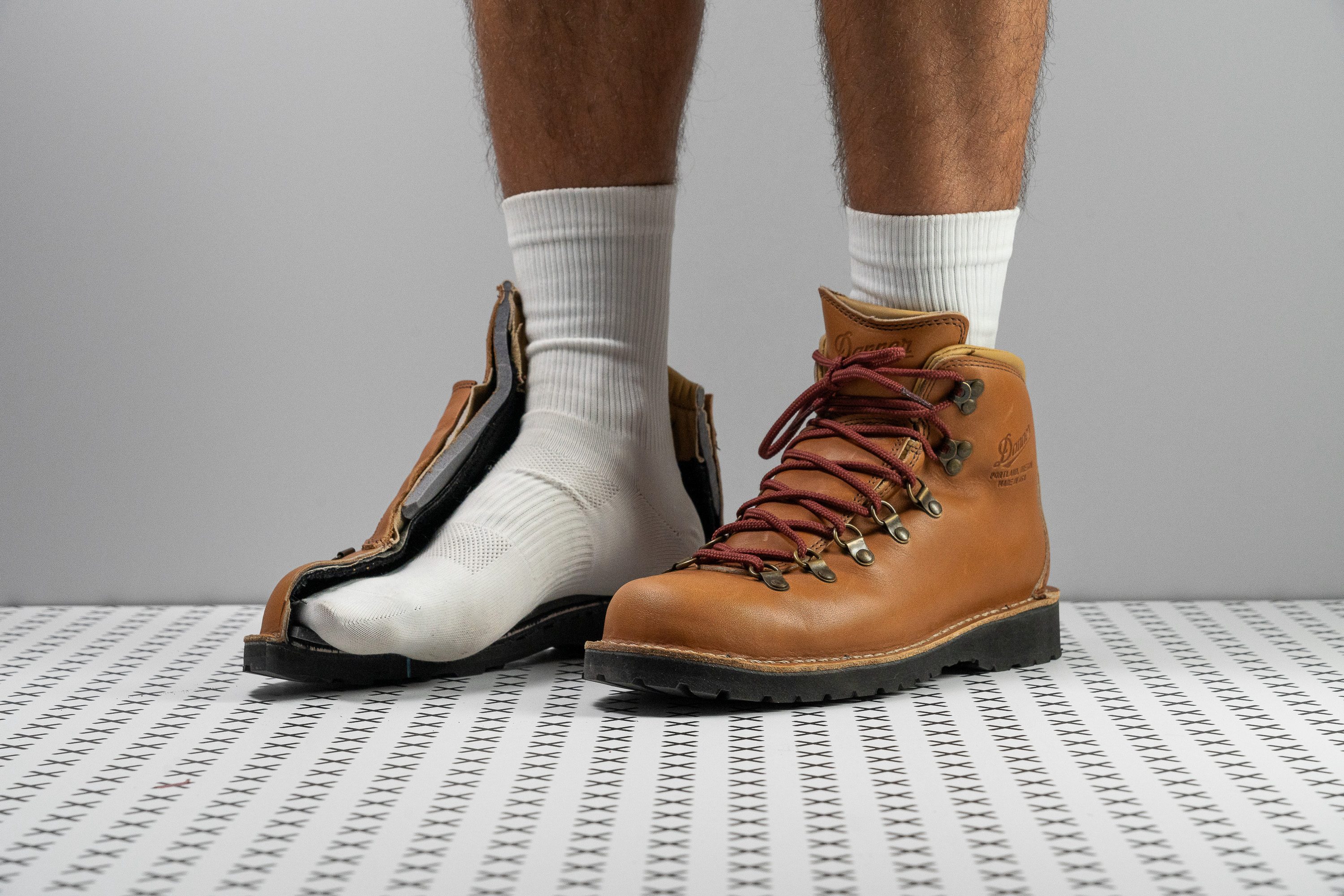Our verdict
- Top pick in best Danner hiking boots
Pros
- Exceptional quality and craftsmanship (USA made)
- Hard-wearing and long-lasting construction
- Four-season boot
- High level of foot protection
- Very secure foothold and support
- Extra stable platform
- Can be resoled and recrafted
- Hard-to-pass vintage appeal
Cons
- Extremely expensive
- Not for serious hikes or challenging terrain
- Much heavier than average
- Narrow toebox
Audience verdict
- Top 8% in hiking boots
- Top 20% in Danner hiking boots
Comparison
The most similar hiking boots compared
+ + Add a shoe | |||||
|---|---|---|---|---|---|
| Audience score | 91 Superb! | 89 Great! | 83 Good! | 90 Great! | |
| Price | $430 | $200 | $110 | $200 | |
| Trail terrain | LightModerate | LightModerate | Moderate | LightModerate | |
| Shock absorption | - | Low | Low | High | |
| Energy return | - | Low | High | High | |
| Weight lab Weight brand | 23.7 oz / 672g 23 oz / 652g | 17 oz / 482g 17 oz / 482g | 18.1 oz / 513g 17.1 oz / 485g | 15 oz / 425g 15 oz / 425g | |
| Lightweight | ✗ | ✓ | ✗ | ✓ | |
| Breathability | Warm | Warm | Moderate | Breathable | |
| Use | Light HikingUrban hiking | Day HikingLight HikingUrban hiking | Light HikingUrban hikingBeginners | Day HikingSpeed HikingLight Hiking | |
| Orthotic friendly | ✓ | ✓ | ✓ | ✓ | |
| Drop lab | 17.5 mm | 13.5 mm | 14.0 mm | 14.4 mm | |
| Size | True to size | True to size | True to size | True to size | |
| Midsole softness | Firm | Firm | Firm | Soft | |
| Difference in midsole softness in cold | Small | Small | Small | Big | |
| Heel counter stiffness | Flexible | Stiff | Flexible | Flexible | |
| Stiffness | Stiff | Moderate | Moderate | Flexible | |
| Outsole hardness | Hard | Very hard | Soft | Very soft | |
| Waterproofing | - | Waterproof | - | - | |
| Material | Leather | Suede | Leather | KnitMesh | |
| Season | Winter | Winter | All seasons | SummerAll seasons | |
| Toebox durability | Good | Decent | - | Decent | |
| Heel padding durability | Good | Decent | - | Good | |
| Outsole durability | Decent | Decent | - | Good | |
| Width / fit | Medium | Medium | Narrow | Wide | |
| Toebox width | Narrow | Medium | Narrow | Medium | |
| Lug depth | 3.1 mm | 3.7 mm | 3.4 mm | 3.7 mm | |
| Heel stack lab | 41.3 mm | 32.7 mm | 34.6 mm | 38.4 mm | |
| Forefoot | 23.8 mm | 19.2 mm | 20.6 mm | 24.0 mm | |
| Widths available | Normal | Normal | NormalWide | Normal | |
| Technology | OrtholiteVibram | Ortholite | Ortholite | - | |
| Cut | High cut | Mid cut | Mid cut | Mid cut | |
| Removable insole | ✓ | ✓ | ✓ | ✓ | |
| Ranking | #3 Top 8% | #8 Top 20% | #31 Bottom 24% | #6 Top 15% | |
| Popularity | #21 Bottom 48% | #29 Bottom 29% | #8 Top 20% | #14 Top 35% |
Who should buy
In our opinion, the Danner Mountain Pass is a no-brainer if you are on the hunt for:
- a retro boot with a strong lumberjack aesthetic and a lace-to-toe design
- a fine-looking boot that makes you feel at home both on the trail and around the town
- premium quality leather and craftsmanship in a boot that's proudly manufactured in the USA
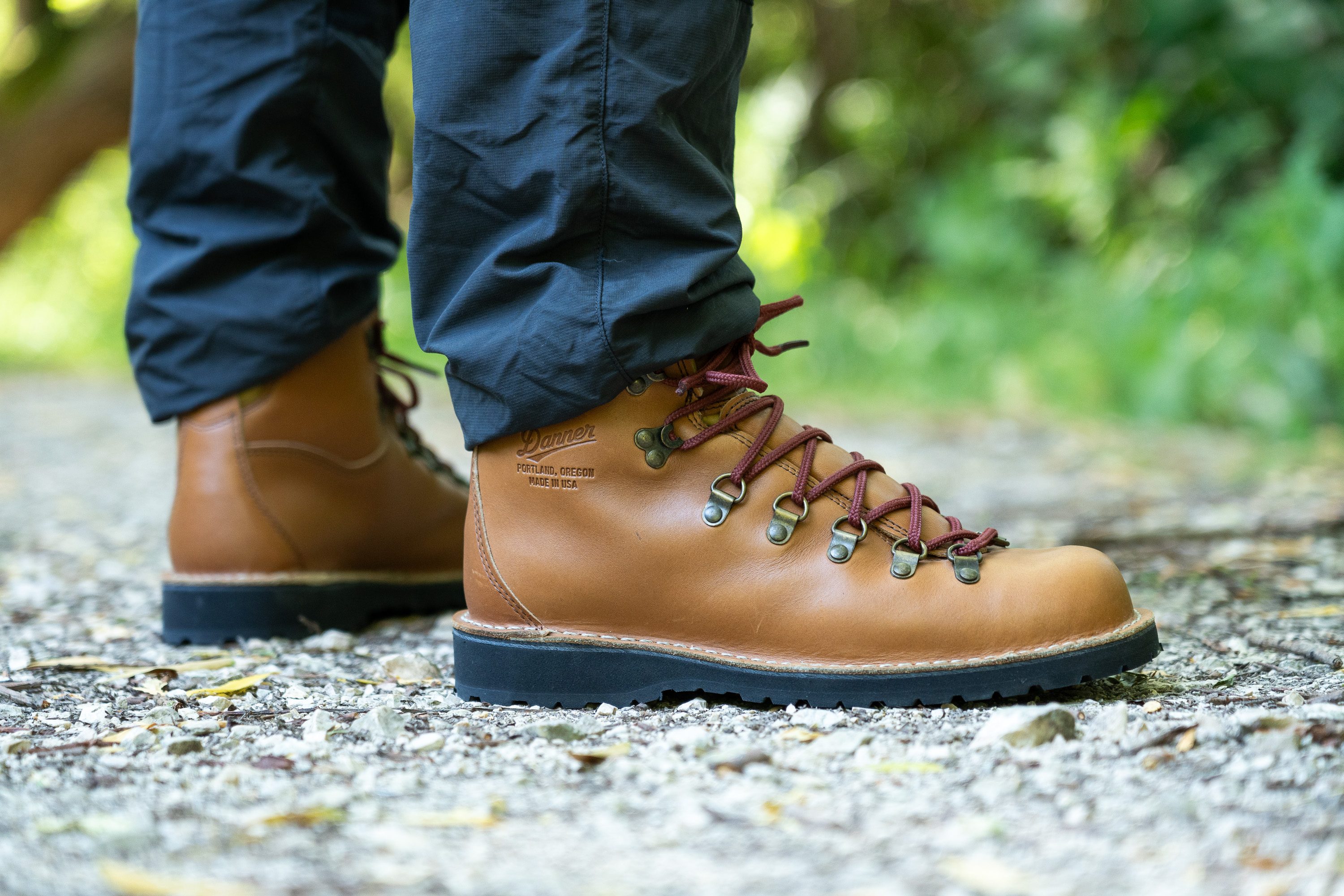
Who should NOT buy
The retail price of the Mountain Pass can be a real deal-breaker for many people. Especially if it's a functional hiking boot that you're after.
For backpacking adventures on technical terrain, we believe that you will appreciate boots like the Scarpa Terra GTX ($249) and the Lowa Renegade GTX Mid ($255) much more. Both options are cheaper, lighter, and more practical than the Mountain Pass on an actual hike.
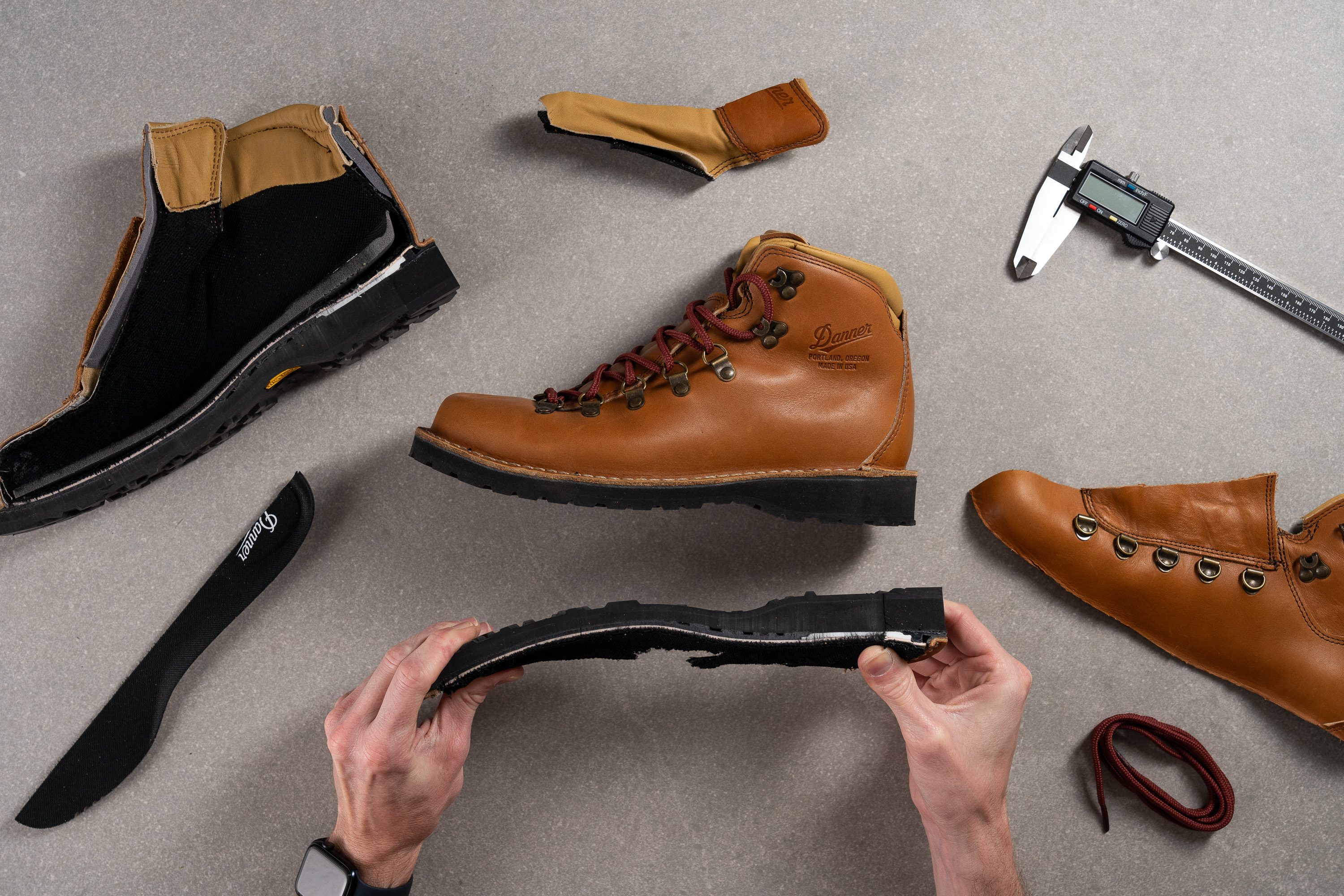
And for less challenging wanders, you can opt for the Danner Mountain 600 or explore our top picks for day hiking.
Cushioning
Heel stack
Just by the look of it, you can tell that the rugged sole of the Mountain Pass is on the taller side of the hiking boot spectrum.
Measuring its heel stack with a caliper, we found it to be identical to that of the Mountain Light - 41.3 mm.
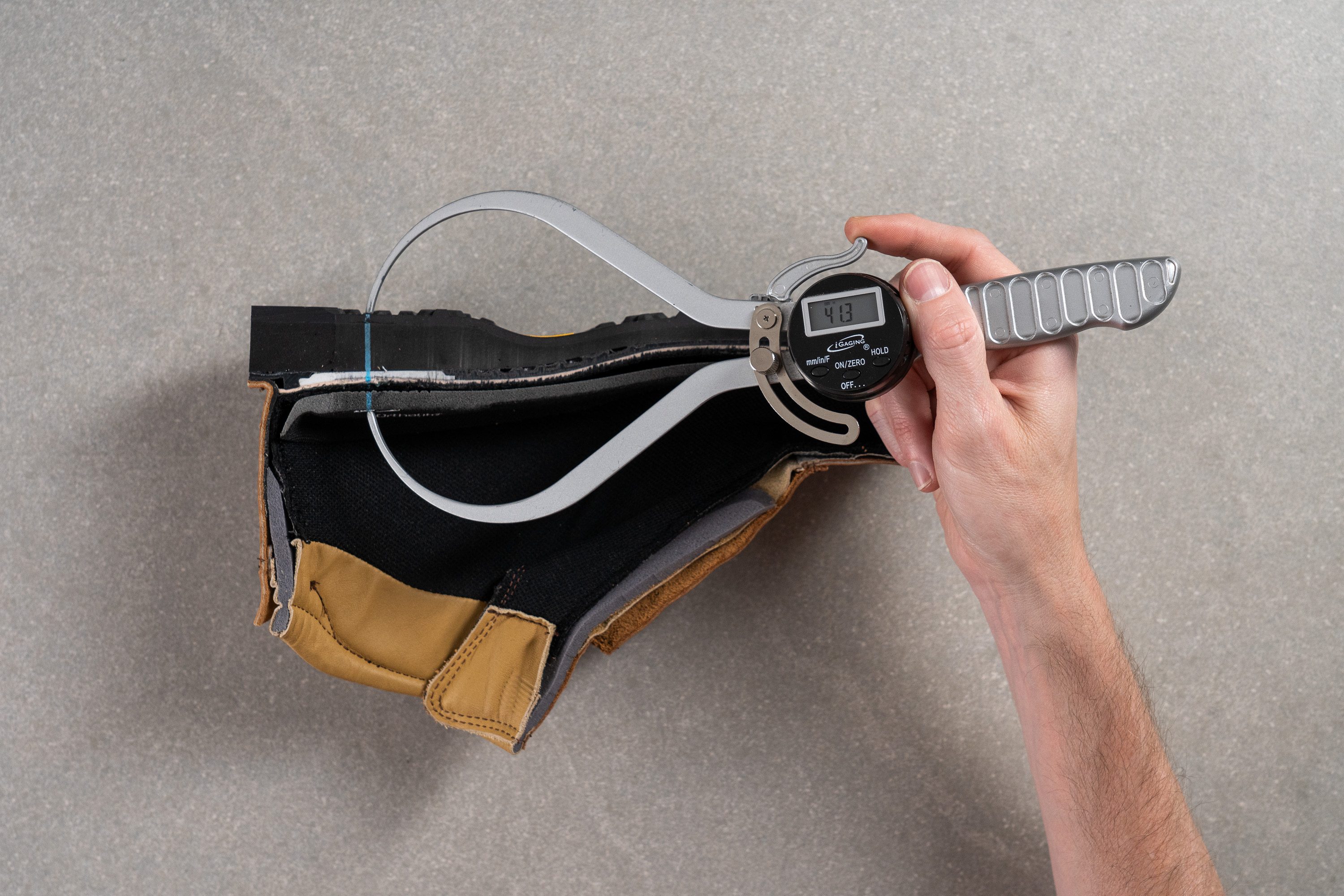
Such a generous amount of rubber and foam made us feel isolated from the trail debris. We could barely feel it when we stepped on rocks and roots in these boots.
| Mountain Pass | 41.3 mm |
| Average | 36.3 mm |
Forefoot stack
The forefoot stack of the Mountain Pass' sole is closer to the average than the heel.
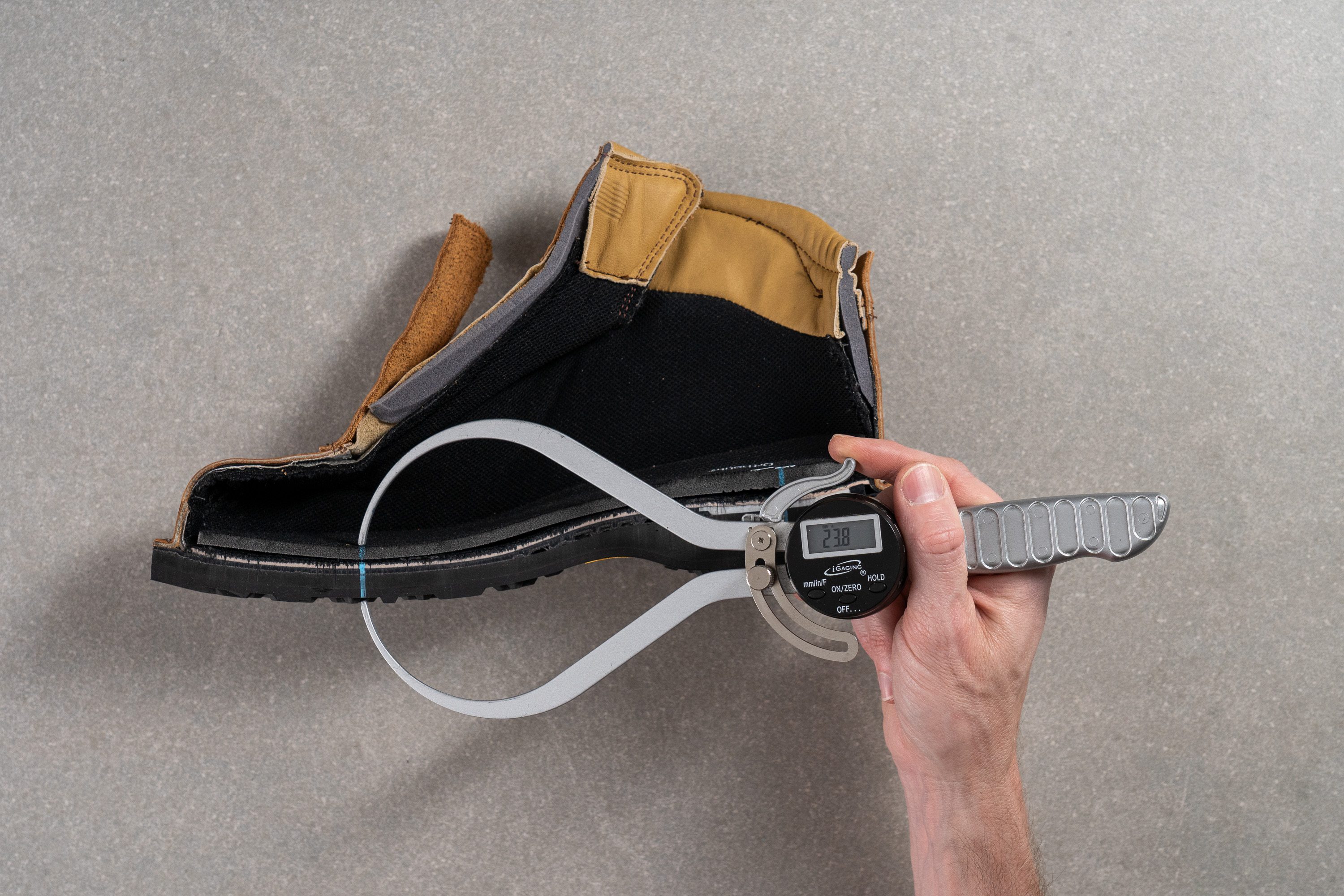
At 23.8 mm, it is a bit more grounded than the aggressive Mountain Light (26.0 mm). But when putting the two boots side-by-side, it seems like the difference is more than a couple of millimeters.
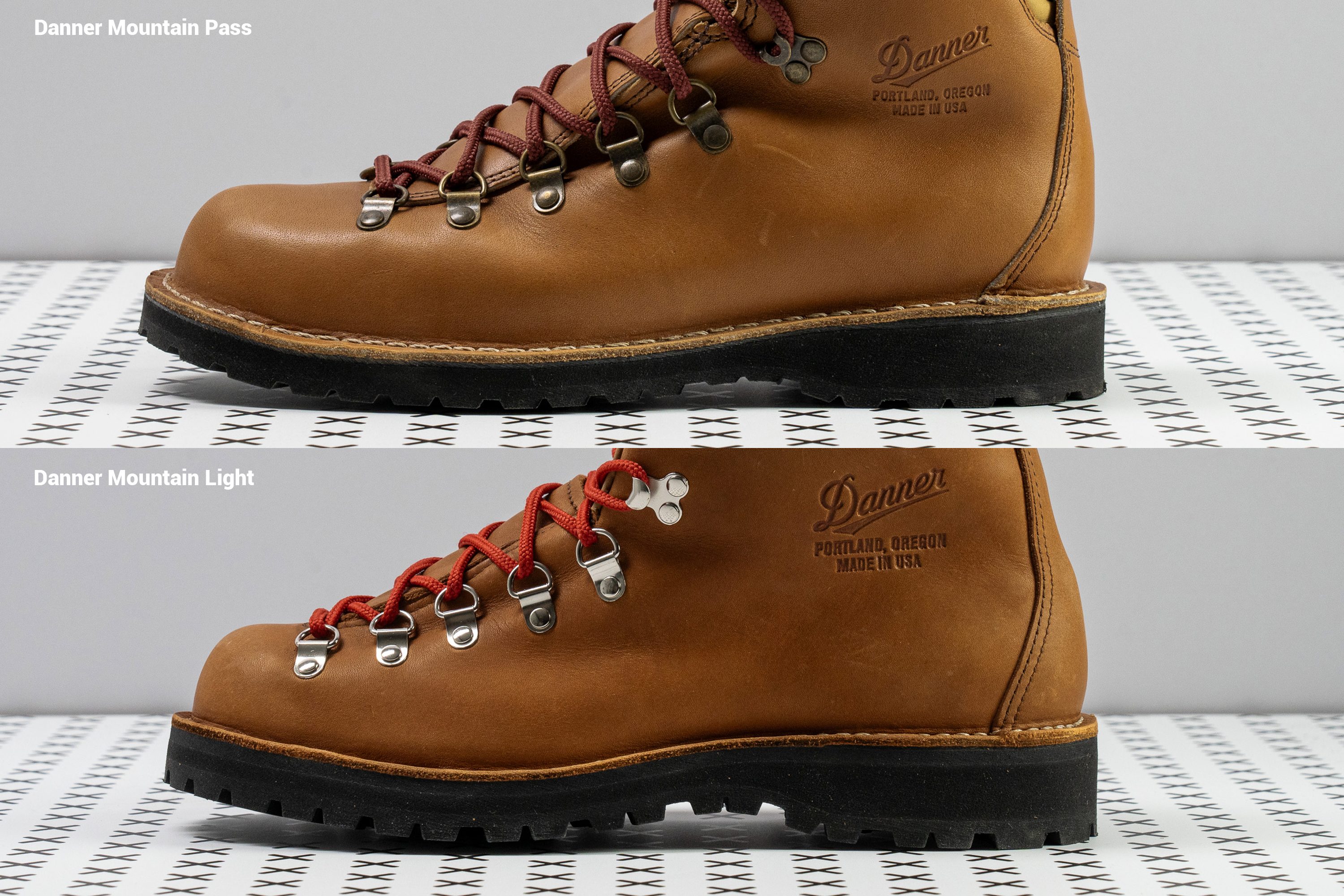
| Mountain Pass | 23.8 mm |
| Average | 23.0 mm |
Drop
As soon as we cut this Danner boot in half, we saw how massive its heel was compared to the forefoot. Such a beefed-up heel created a pretty steep slope (or drop) of 17.5 mm.
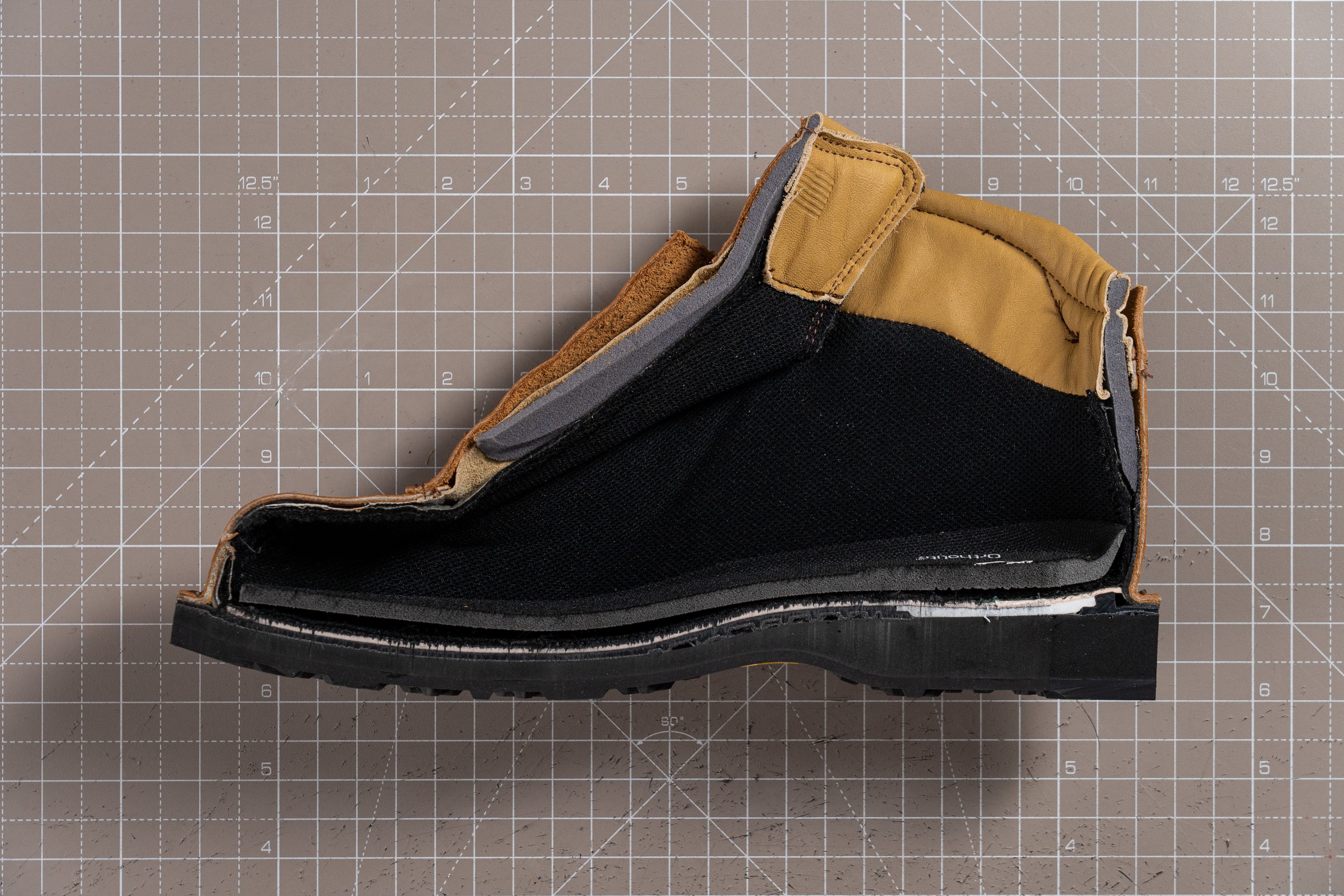
But as far as Achilles' support is concerned, this is good news. You want your heel to be raised higher above the toes to relieve the pressure of this tendon. However, with the average heel-to-toe drop hovering around 12-14 mm, 17.5 mm might feel too high for some.
| Mountain Pass | 17.5 mm |
| Average | 13.3 mm |
Midsole softness
It seems like vintage hiking boots and plush cushioning exist in parallel universes.
Inspired by old-fashioned logging boots, the Mountain Pass uses a pretty firm foam for the midsole. Pressing our Shore A durometer against it returned 34.6 HA which is 25% harder than the average hiking boot.
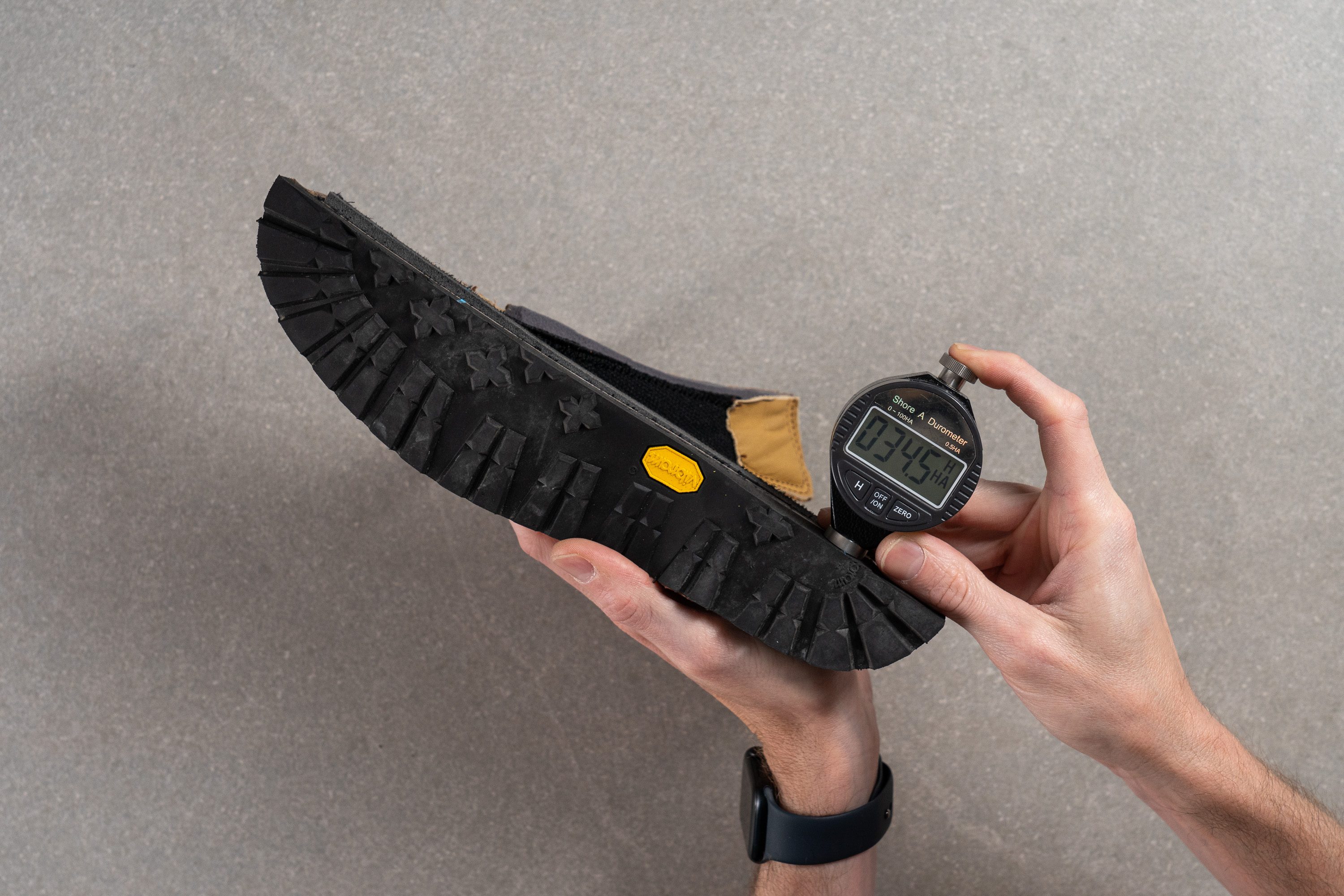
Given that it's some of the firmest readings we've recorded in our lab, we can hardly call it "cushioning." The ride feels very firm but, granted, it is stable.
| Mountain Pass | 34.6 HA |
| Average | 28.4 HA |
Size and fit
Size
Danner Mountain Pass fits true to size (15 votes).
Internal length
| Mountain Pass | 276.9 mm |
| Average | 271.4 mm |
Width / Fit
Even though the Danner Mountain Pass is offered in an EE (Wide) width, we found it to be even narrower than the standard D width in other brands!
Measuring the boot's width in the widest area, we only got 91.3 mm, which is a couple of millimeters narrower than the average.
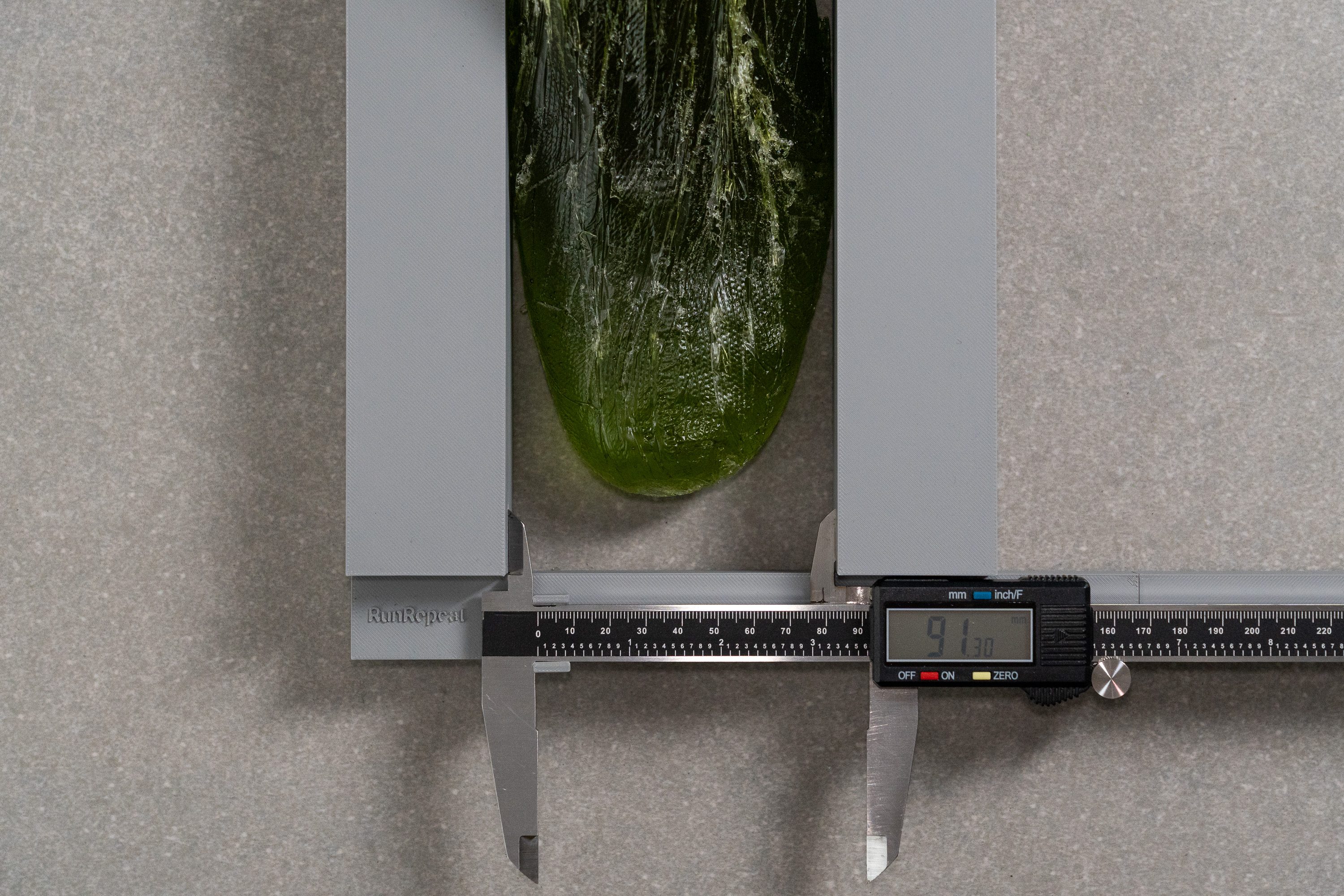
But at least it's not as narrow as the Mountain Light (89.9 mm)! That's because the two boots were built on different lasts - the 650 (Mountain Light) and the 503 (Mountain Pass). The latter is described as a "casual fit" on the brand's website.
In addition, you can see that the lacing of the Pass doesn't extend as far to the toebox as on the Light.
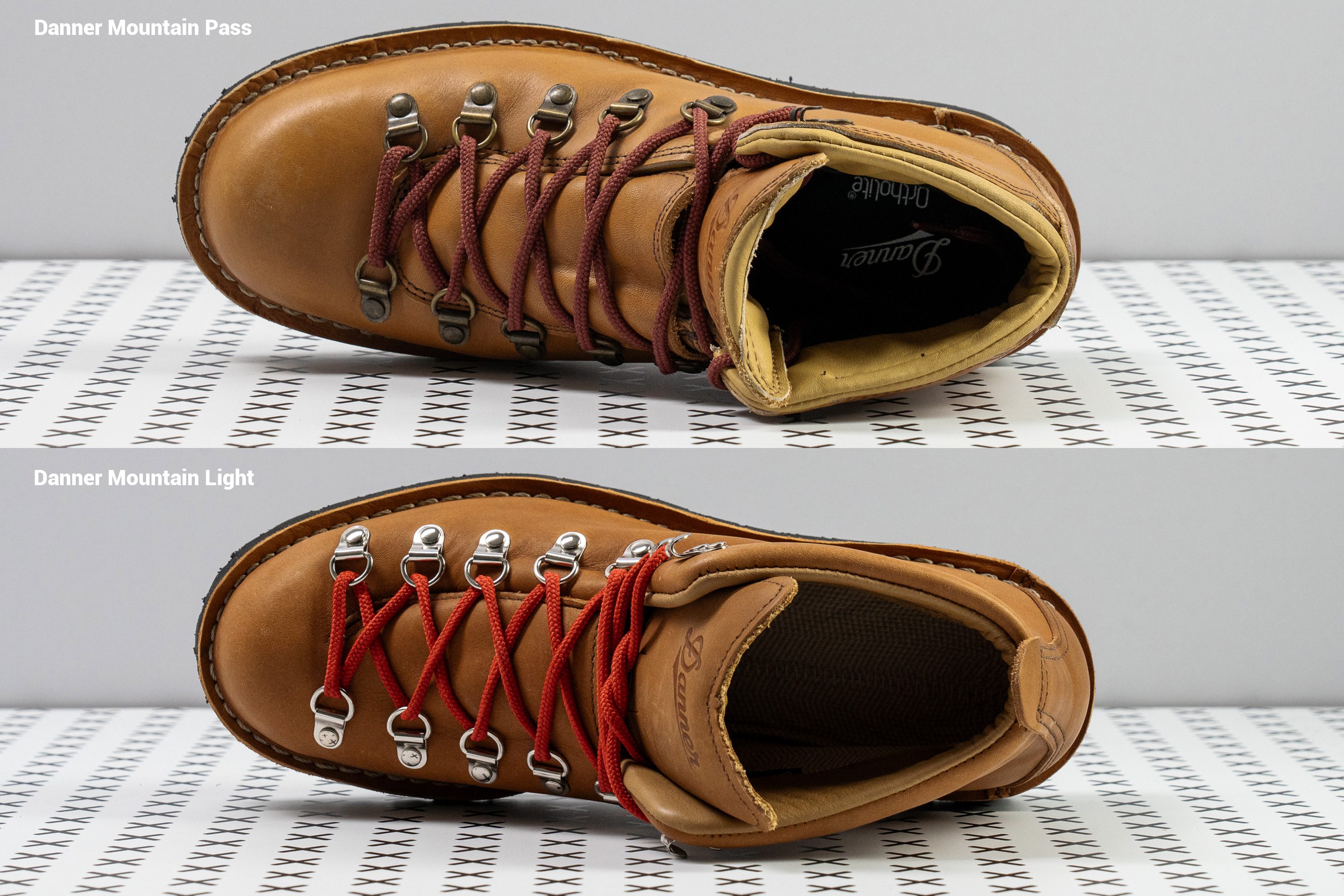
| Mountain Pass | 91.3 mm |
| Average | 93.8 mm |
Toebox width
As expected, the toebox of the Mountain Pass gets even narrower towards the front. Our caliper recorded another below-average reading of 67.6 mm in the big toe area.
But thankfully, it's not as slender as the Mountain Light which comes in at only 64.5 mm!
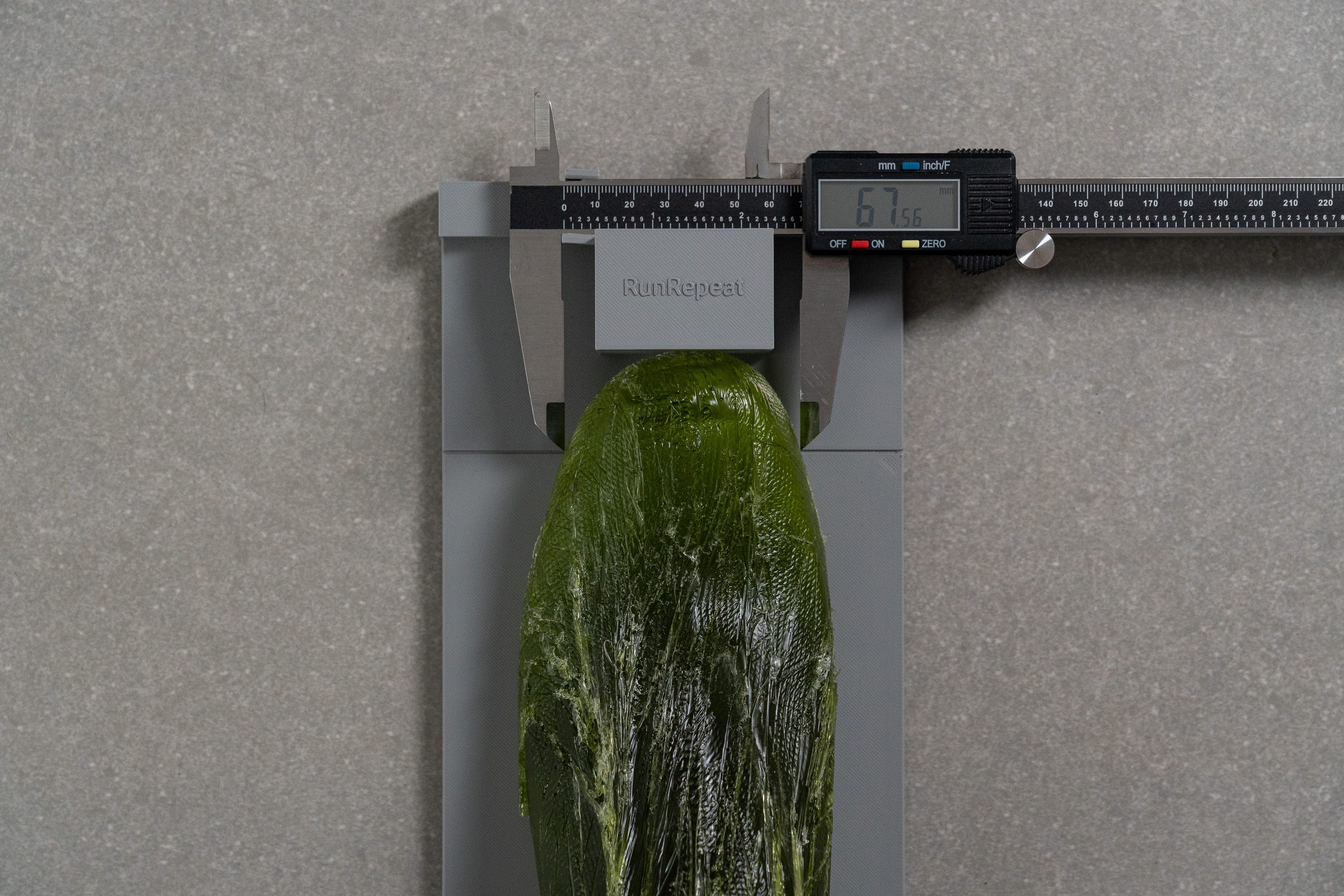
| Mountain Pass | 67.6 mm |
| Average | 71.2 mm |
Toebox height
The boot's toebox height is not as abundant either with a moderate caliper reading of 25.8 mm. It is slightly shallower than average but not too restricting on the toes.
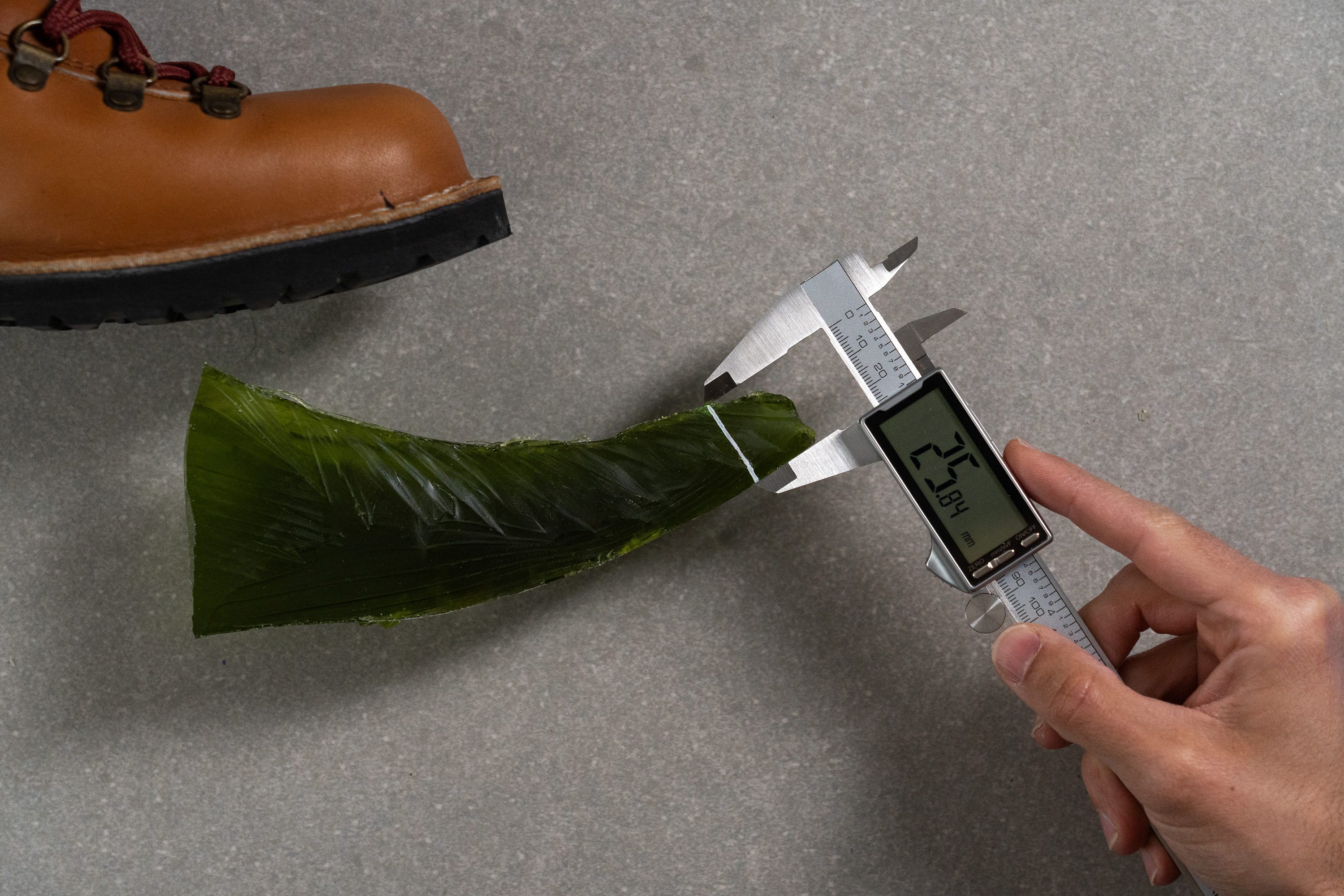
| Mountain Pass | 25.8 mm |
| Average | 27.4 mm |
Laces
The boot features a heritage lace-to-toe setup which serves both form and function.
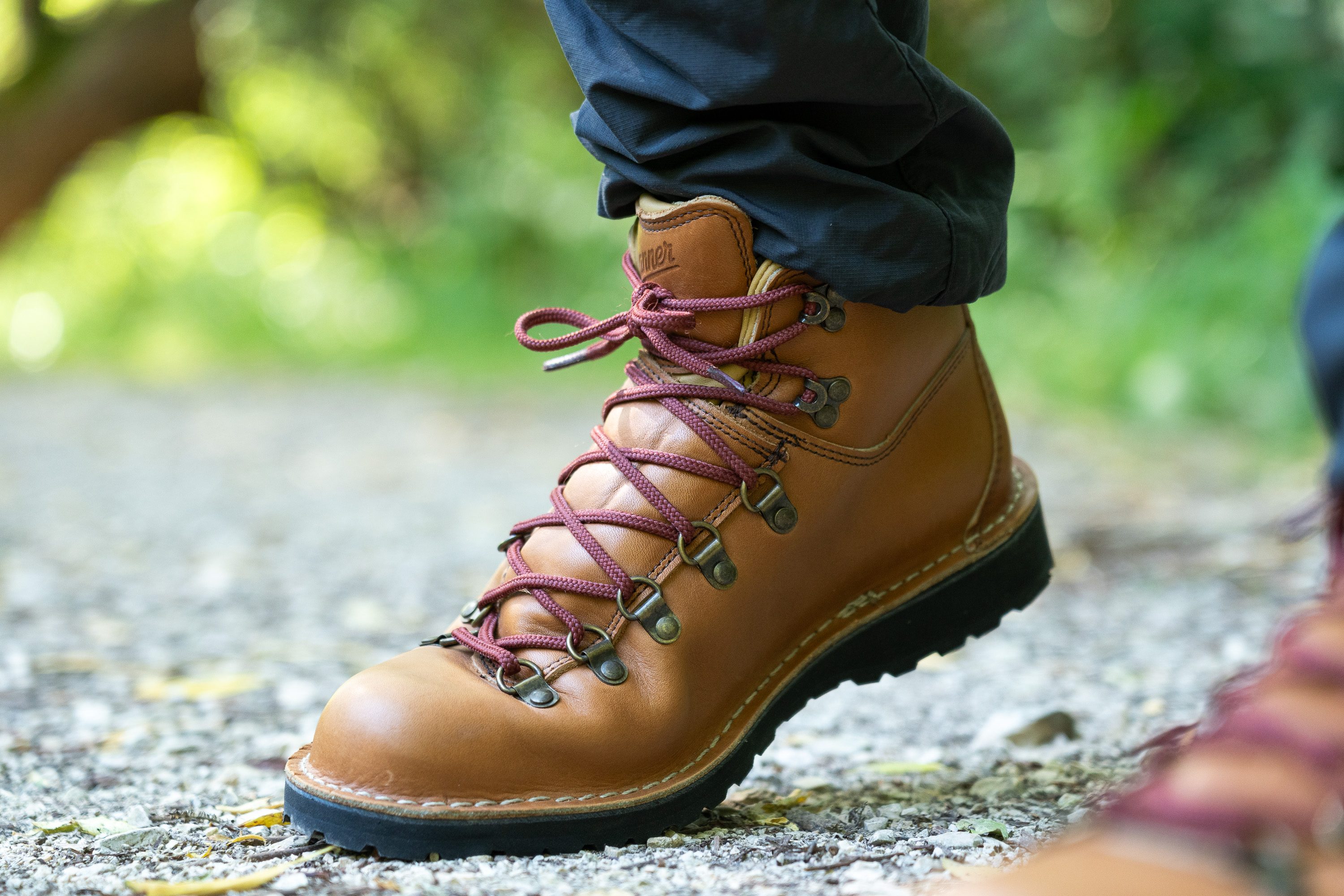
From a practical standpoint, this type of lacing helps to add structure to the boot and makes the lace pressure more even throughout the instep. You don't need to cinch the laces extra tight to feel supported.
And style-wise, doesn't it just look good?
Traction / Grip
Lug depth
According to the brand's official description of the Mountain Pass, the boot was designed "with light hikes and city streets in mind."
So, from the start, it set our bar low when it comes to the boot's lugs and grip.
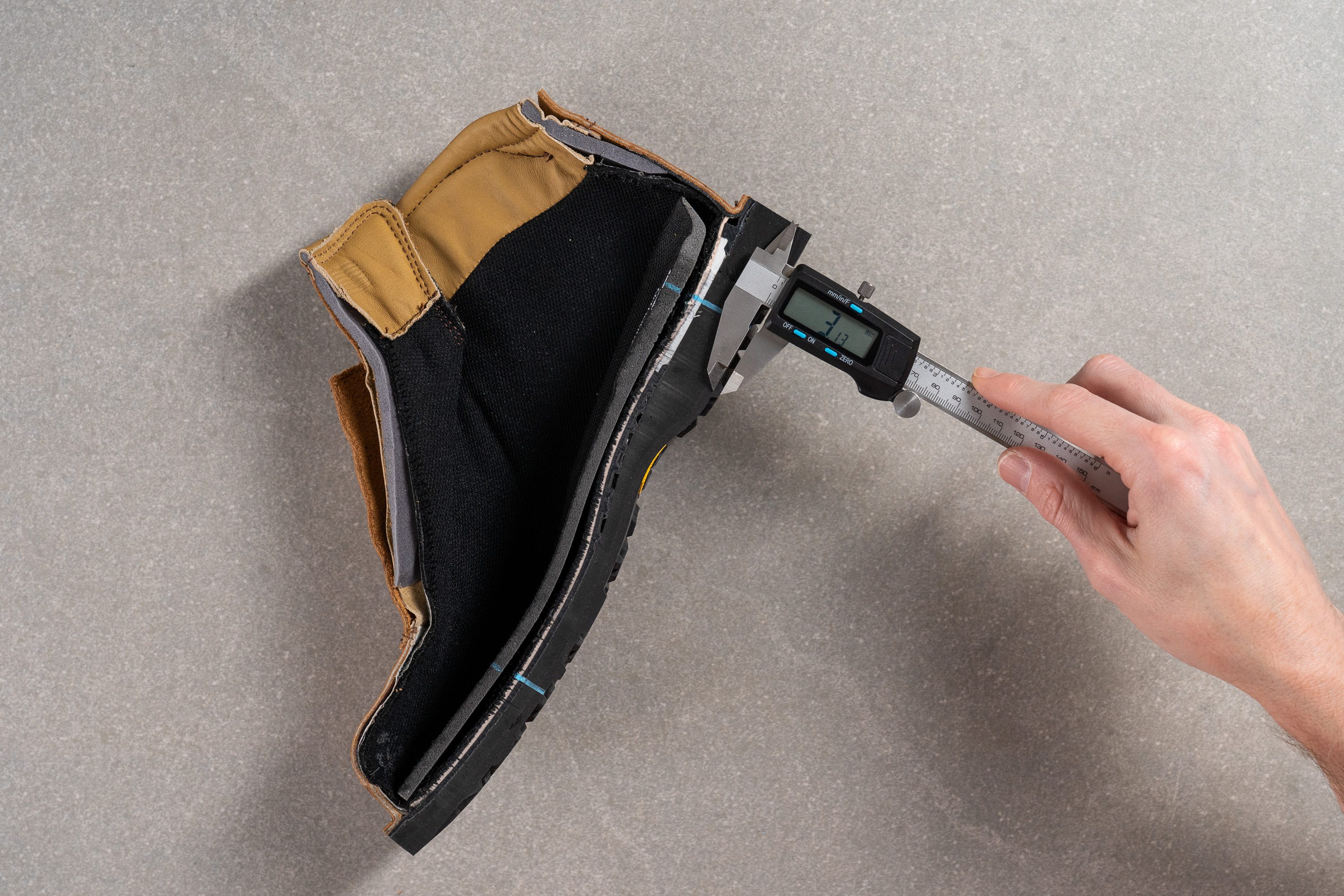
Measuring the lug depth with a caliper, we found them to be shallower than average indeed. At 3.1 mm, they are a millimeter smaller than the average and don't make the best match for muddy, rocky, or any other type of challenging terrain.
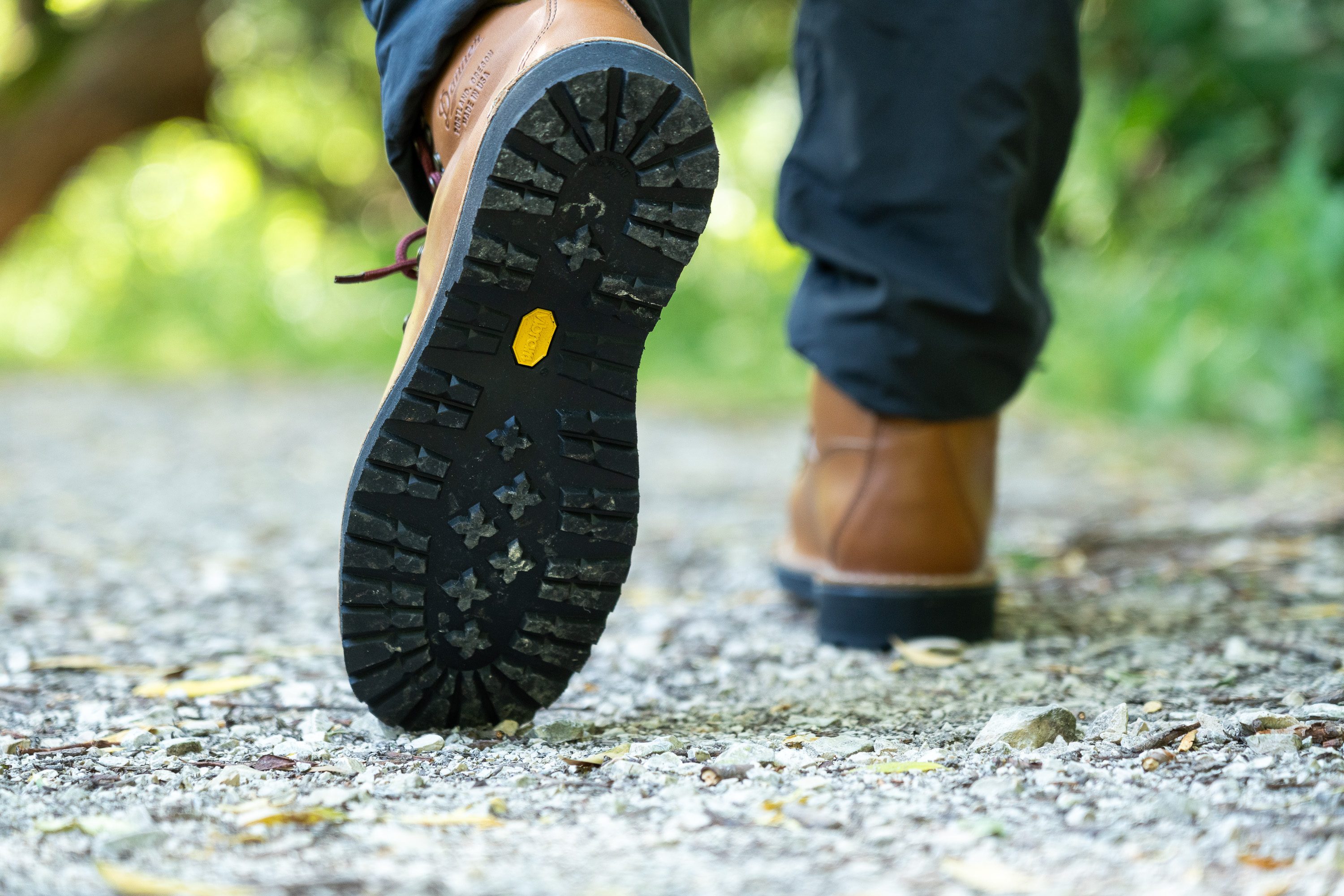
We subscribe to Danner's product description and recommend limiting the use of this Danner boot to urban surfaces and easy maintained trails.
| Mountain Pass | 3.1 mm |
| Average | 4.3 mm |
Flexibility / Stiffness
If you are used to buttery-soft heel-to-toe transitions in your footwear, the Danner Mountain Pass will give you a bit of a culture shock.
You wouldn't expect a leather boot with a shank to bend so easily, right?
But let the numbers talk now. Using a gauge, we measured how much force it takes to bend the boot to a 90-degree angle. At 57.7N, it took 30% more than the average hiking boot!
But even though it's on the stiffer side, the Mountain Pass is not as unforgiving as the Mountain Light (it took a massive 80.3N to bend that one!).
This test follows an older methodology, which is why you don't see recently tested shoes in the chart. Results from different methodologies can not be compared.
| Mountain Pass | 57.7N |
| Average | 44.3N |
Stiffness in cold (%)
At least the Mountain Pass won't surprise you with increased stiffness on a freezing day.
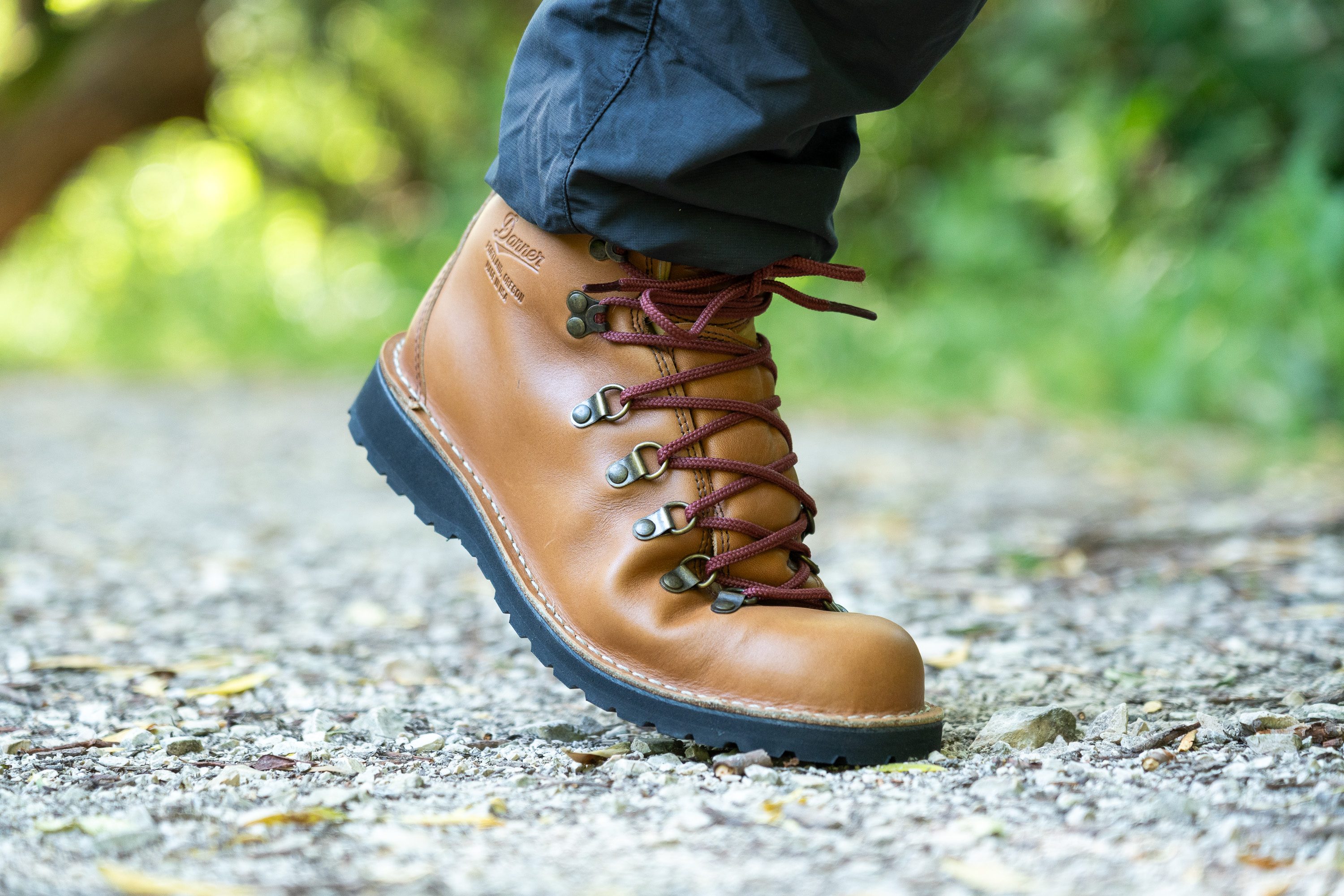
Having exposed the boot to low temperatures for 20 minutes, we found that it only got 9.5% more rigid. This is much less than the average difference of 25% among hiking boots.
No need to "defrost" this Danner before the hike!
| Mountain Pass | 10% |
| Average | 24% |
Weight
Danner boots just keep setting weight records in our lab and the Mountain Light is the winner by far at 28.3 oz (802g)!
Luckily, the Mountain Pass showed a notably smaller number on the scale. Despite its close resemblance to the Mountain Light, it returned "only" 23.7 oz (672g).
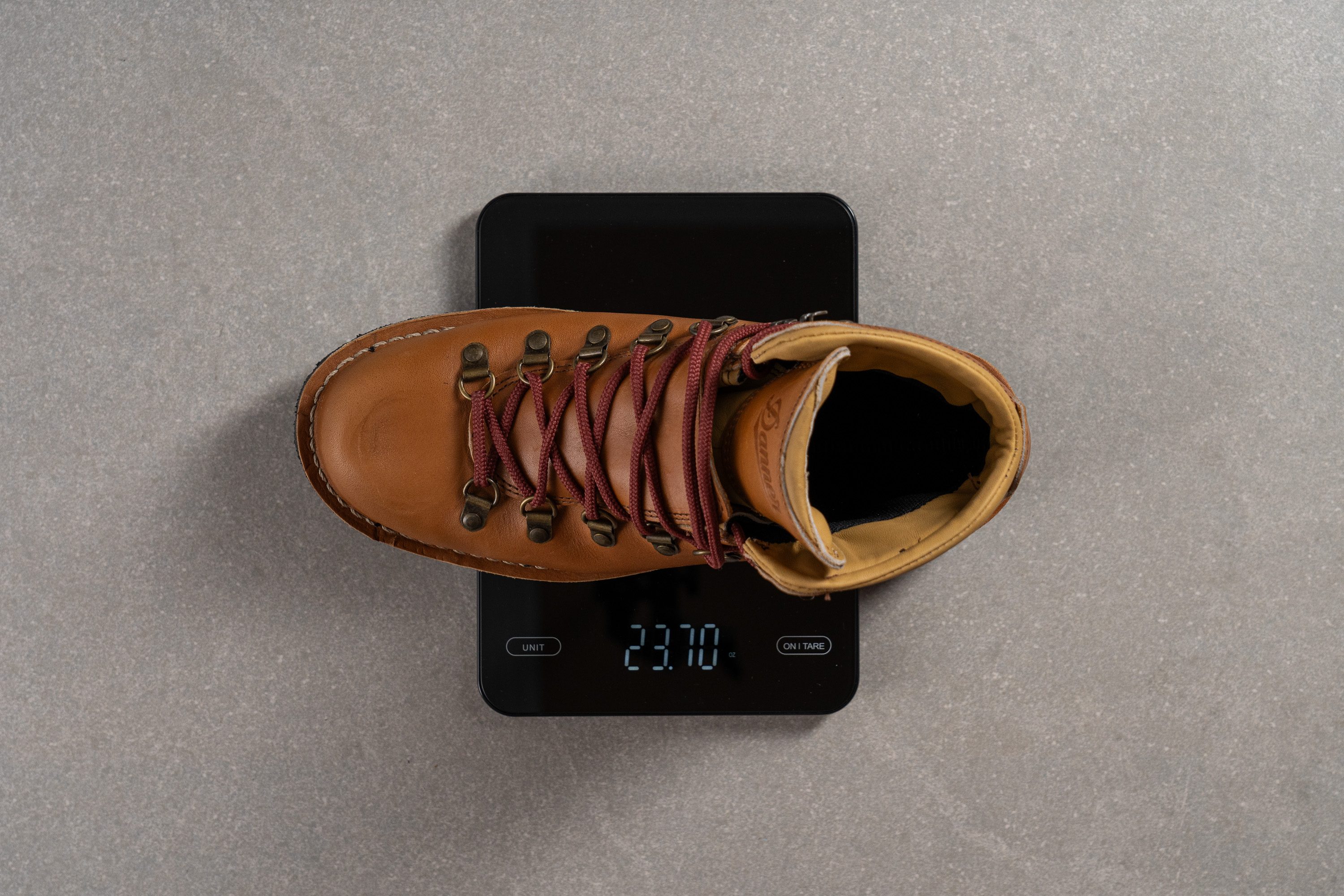
Getting a hiking boot like this, you should be prepared for the extra heft on your feet. It is going to leave you feeling more tired at the end of the day than a lighter pair of boots would.
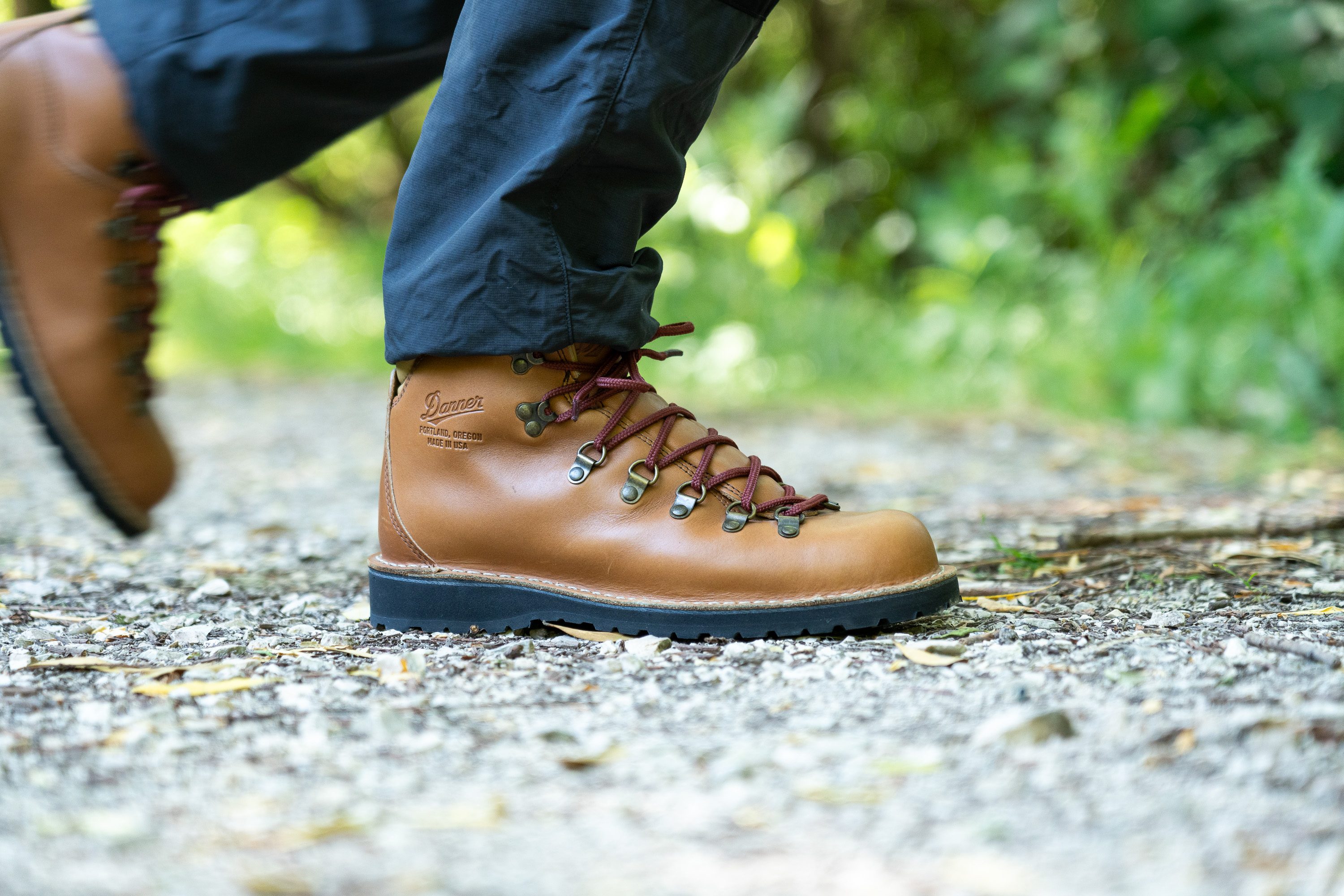
| Mountain Pass | 23.7 oz (672g) |
| Average | 18.7 oz (531g) |
Breathability
With its 5-inch collar all covered in thick leather, we never expected the Mountain Pass to be a breathable boot.
In our smoke-pumping machine test above you can see that the sturdy upper of this Danner boot lets zero smoke pass through. There are no ventilation holes whatsoever.
On the bright side, the Mountain Pass makes for a great four-season boot. Sure, it will not work for extreme weather conditions like scorching hot or freezing cold days, but it can keep your feet cozy in a pretty wide temperature range. You can always regulate the warmth by wearing different socks of different densities.
| Mountain Pass | 1 |
| Average | 1.3 |
Waterproofing
In this review, we are looking at the Horween Rio colorway. It is the boot's non-waterproof version which comes with a breathable Dri-Lex lining inside.
However, the boot's high-top leather upper still provides a basic level of water resistance and should keep your feet dry in drizzles and moderate water splashes. But if you get caught in a downpour or submerge the boot in creeks and puddles a lot, do expect some water to seep inside.
For these conditions, as well as for low temperatures and snow, consider the Gore-Tex version of the boot. The Gunmetal, Black Glace, and Smores colorways all come with a waterproof Gore-Tex lining. Interestingly, they cost exactly the same as their non-waterproof Dri-Lex counterpart ($430).
Stability
Lateral stability test
With the Danner Mountain Pass, you simply forget about the possibility of rolling your ankles.
From the ground up, the boot features a sturdy construction that doesn't allow any undue ankle movements even when the surface gets hilly.
Torsional rigidity
We found it impossible to twist the Mountain Pass with our bare hands! Thus, we gave this Danner boot a maximum stiffness score of 5/5 in our torsional rigidity test.
It seems like every component of this boot is set to have a maximum level of sturdiness: the hard rubber outsole, the firm midsole, the stiff shank inside, the tough leather upper, etc.
The foot containment and side-to-side stability that this pair provides deserve the highest praise from us.
| Mountain Pass | 5 |
| Average | 4.4 |
Heel counter stiffness
Manually checking the boot's heel counter stiffness, we found that it balances between flexibility and stiffness. On a 1-5 scale, we rated its rigidity with a middle-of-the-road score of 3.
Considering that the boot's heel counter is stiffer at the bottom and gets more flexible towards the collar, we didn't experience any issues with heel shifting or slipping in the Mountain Pass.
But we did appreciate a bit more freedom of movement at the top of the boot.
| Mountain Pass | 3 |
| Average | 3.6 |
Midsole width - forefoot
The Danner Mountain Pass offered us a solid footing throughout the entire wear test.
In addition to its sturdy build and a stability shank inside, the boot also has a pretty wide landing area, specifically in the forefoot.
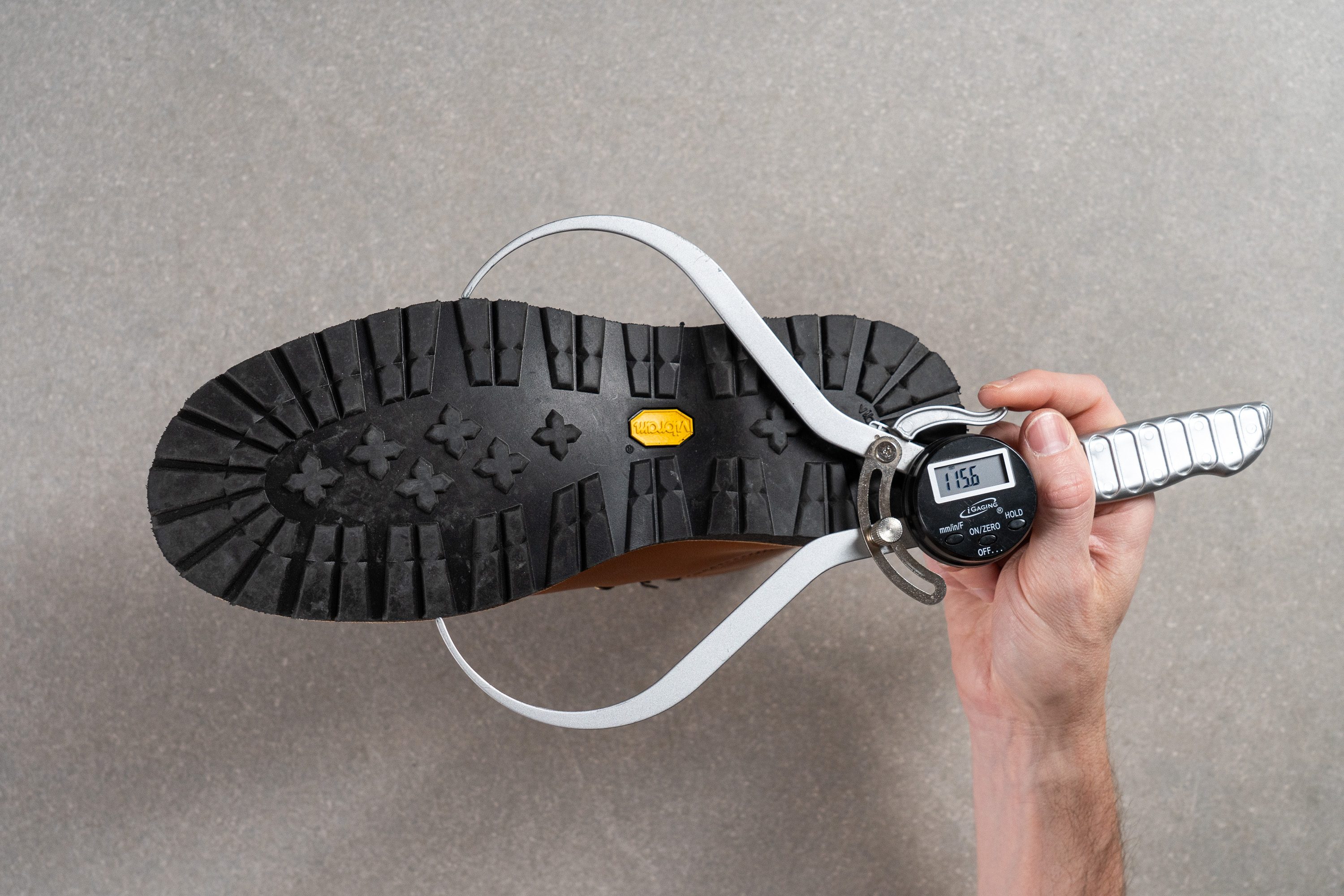
Measuring the widest part of the sole with a caliper, we got a reading of 115.6 mm. This is almost 4 mm wider than average! We felt nice and planted with these sole dimensions.
| Mountain Pass | 115.6 mm |
| Average | 111.5 mm |
Midsole width - heel
Even though the boot's heel width doesn't reach the industry average, we found it to be sufficiently wide at 83.8 mm.
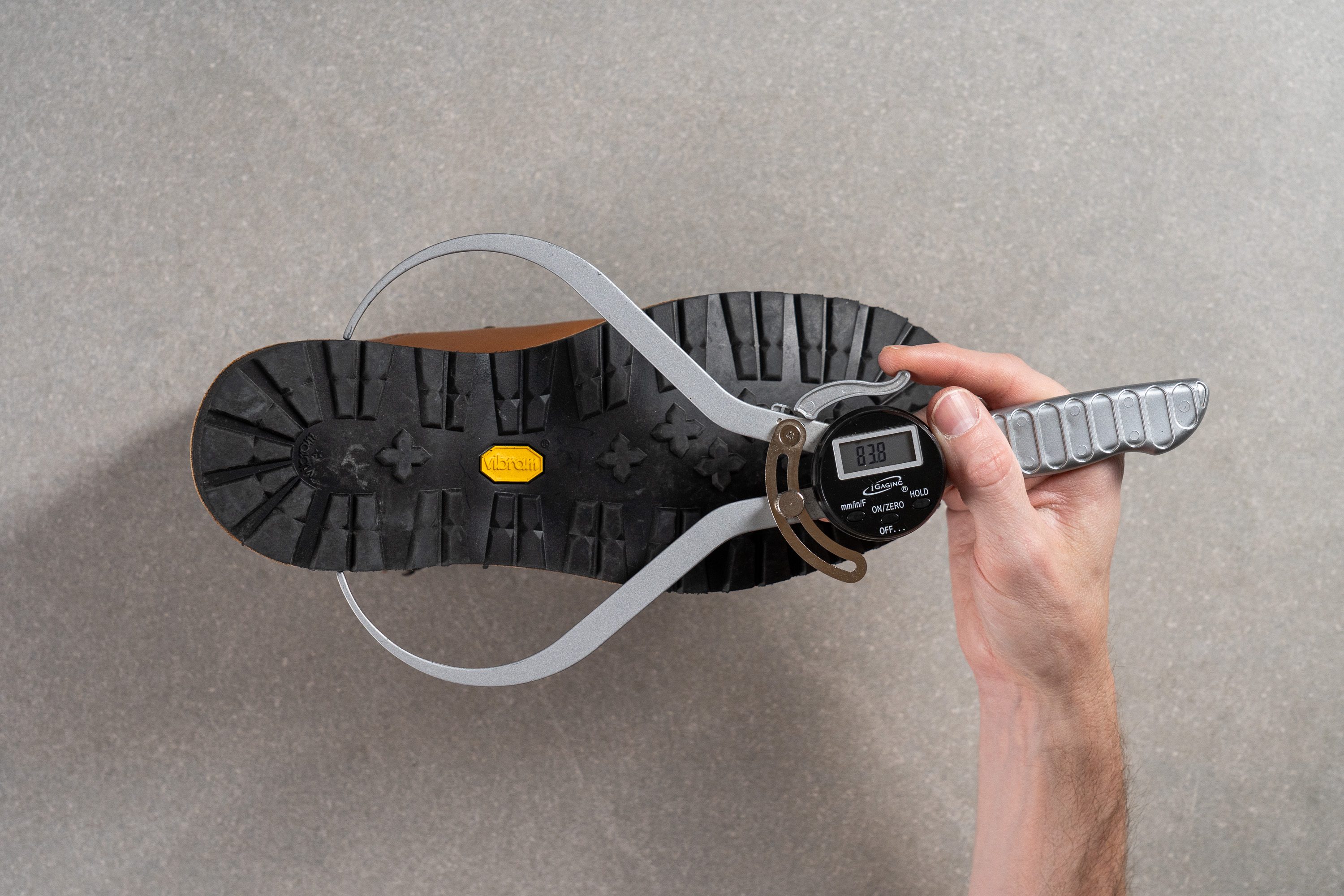
| Mountain Pass | 83.8 mm |
| Average | 87.6 mm |
Durability
Toebox durability
Danner boots have a stellar reputation when it comes to durability. Manufactured in Portland, Oregon (USA), they promise the highest quality of craftsmanship.
And we could surely smell that quality as we were taking the Mountain Pass out of the box. That was the fragrance of the finest quality leather.
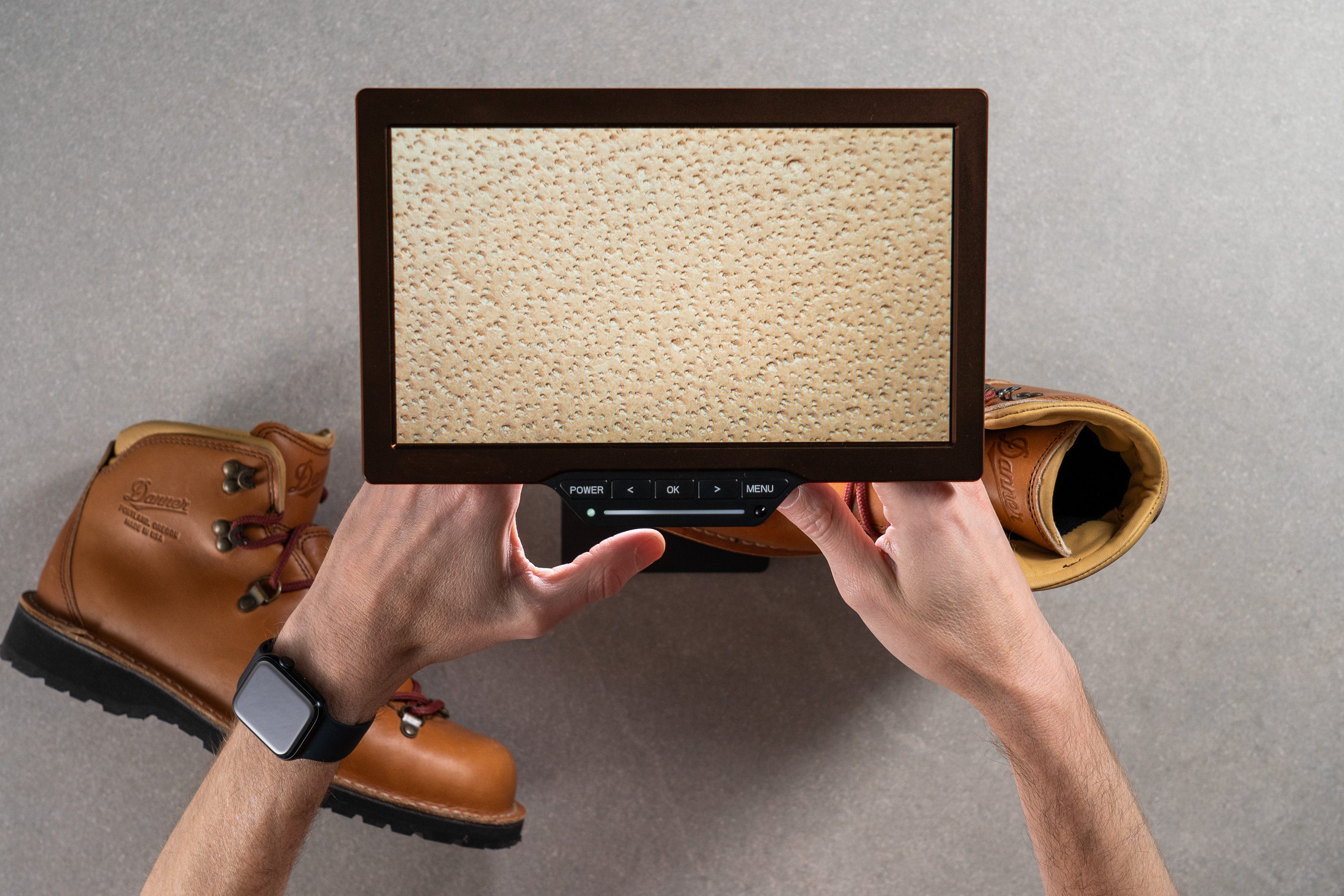
Inspecting the material under the microscope, we saw the pores of flawless full-grain leather. Perfection!
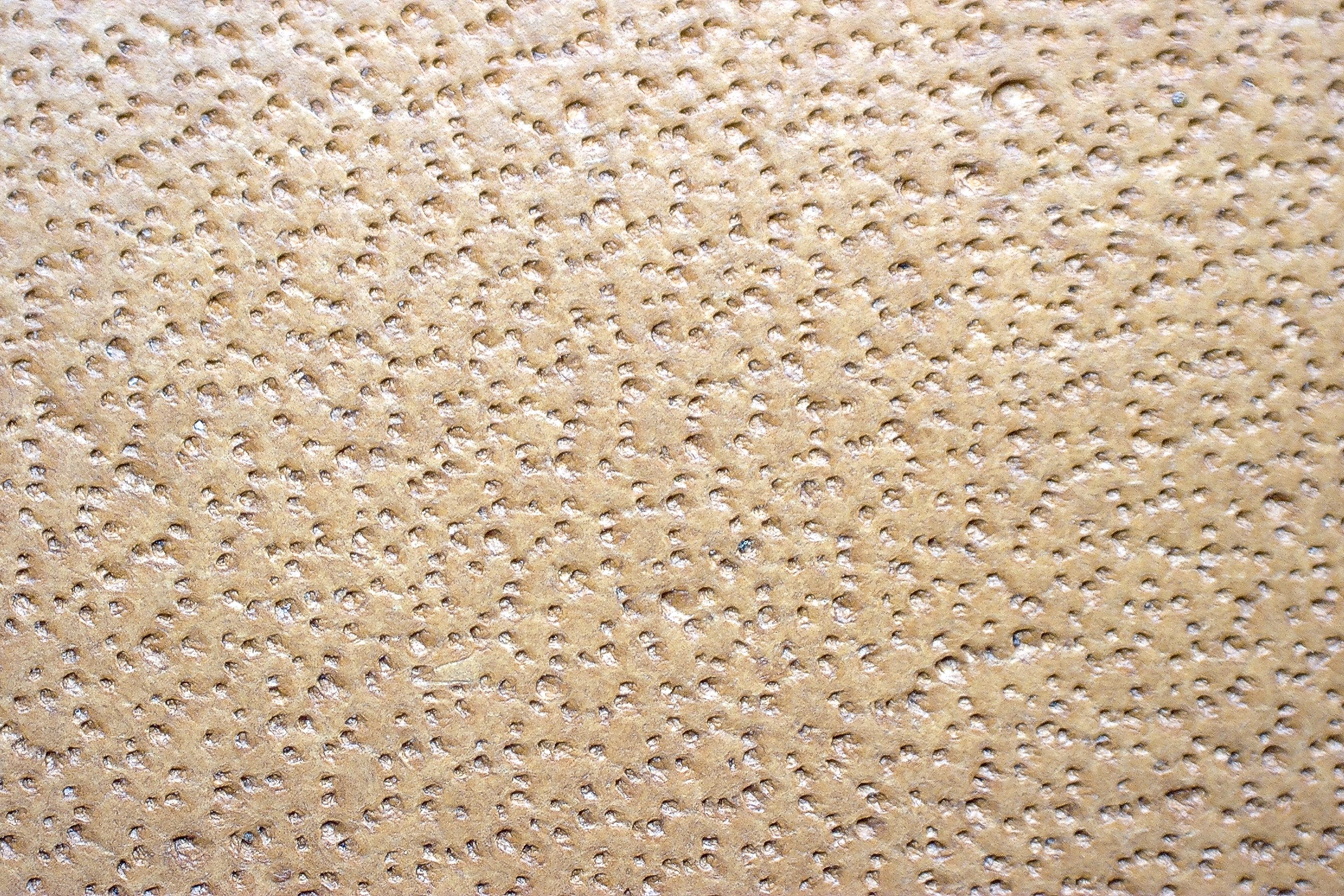
But let's see if the wear resistance and durability of that leather live up to the premium price tag.
After 12 seconds of drilling the boot's toebox with sandpaper, a tiny scratch confirmed that the boot was ready for some serious wear and tear. This is a solid 5 out of 5 score for toebox durability!
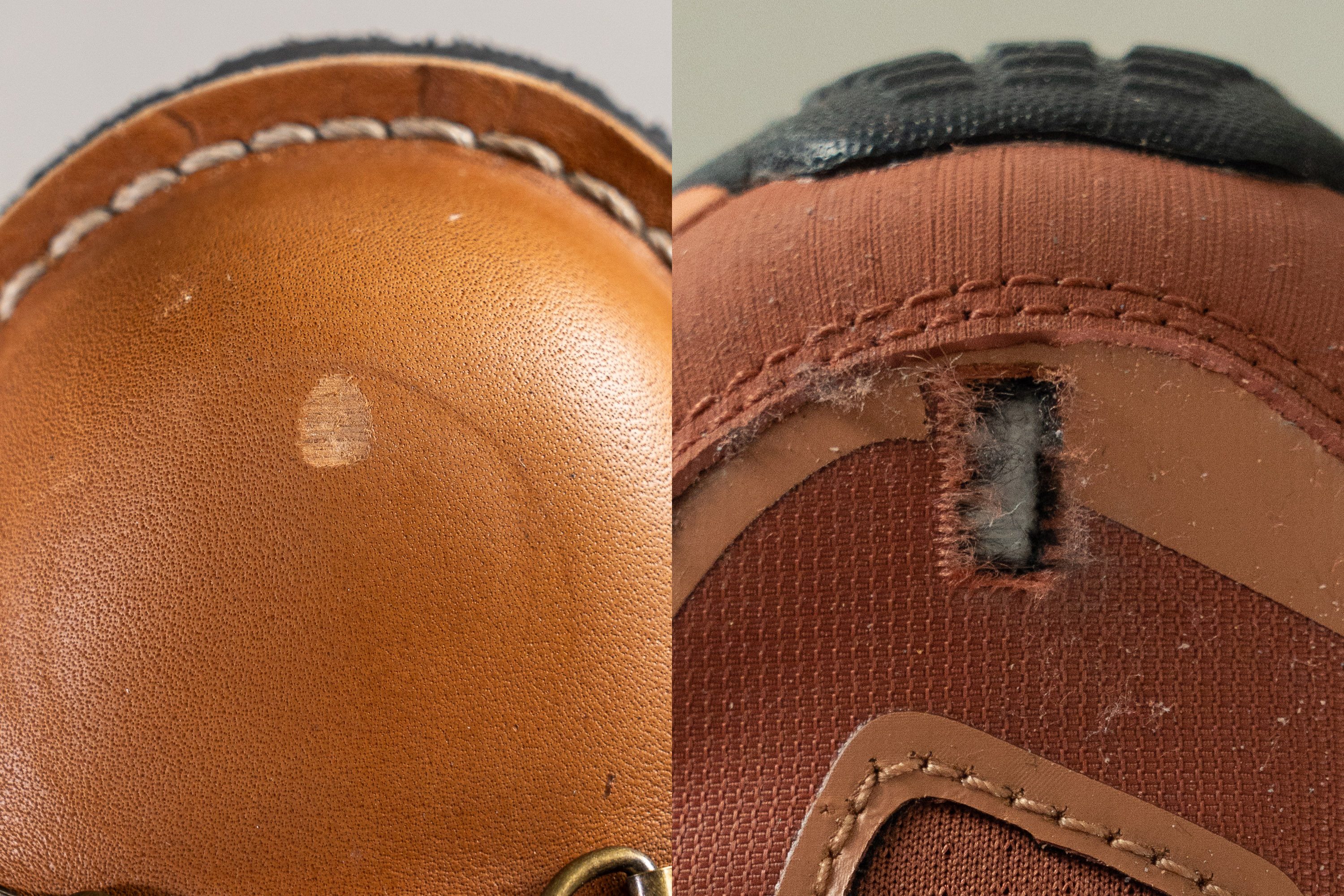
Compared to hiking boots with synthetic/textile uppers, this leather boot was made to last for years.
| Mountain Pass | 5 |
| Average | 4.3 |
Heel padding durability
The inner side of the boot's collar is also lined with leather but of a softer kind.
The scuff that our Dremel left on it is barely worth the attention. Where mesh liners are torn apart after only 4 seconds of drilling, the Mountain Pass remained unscathed.
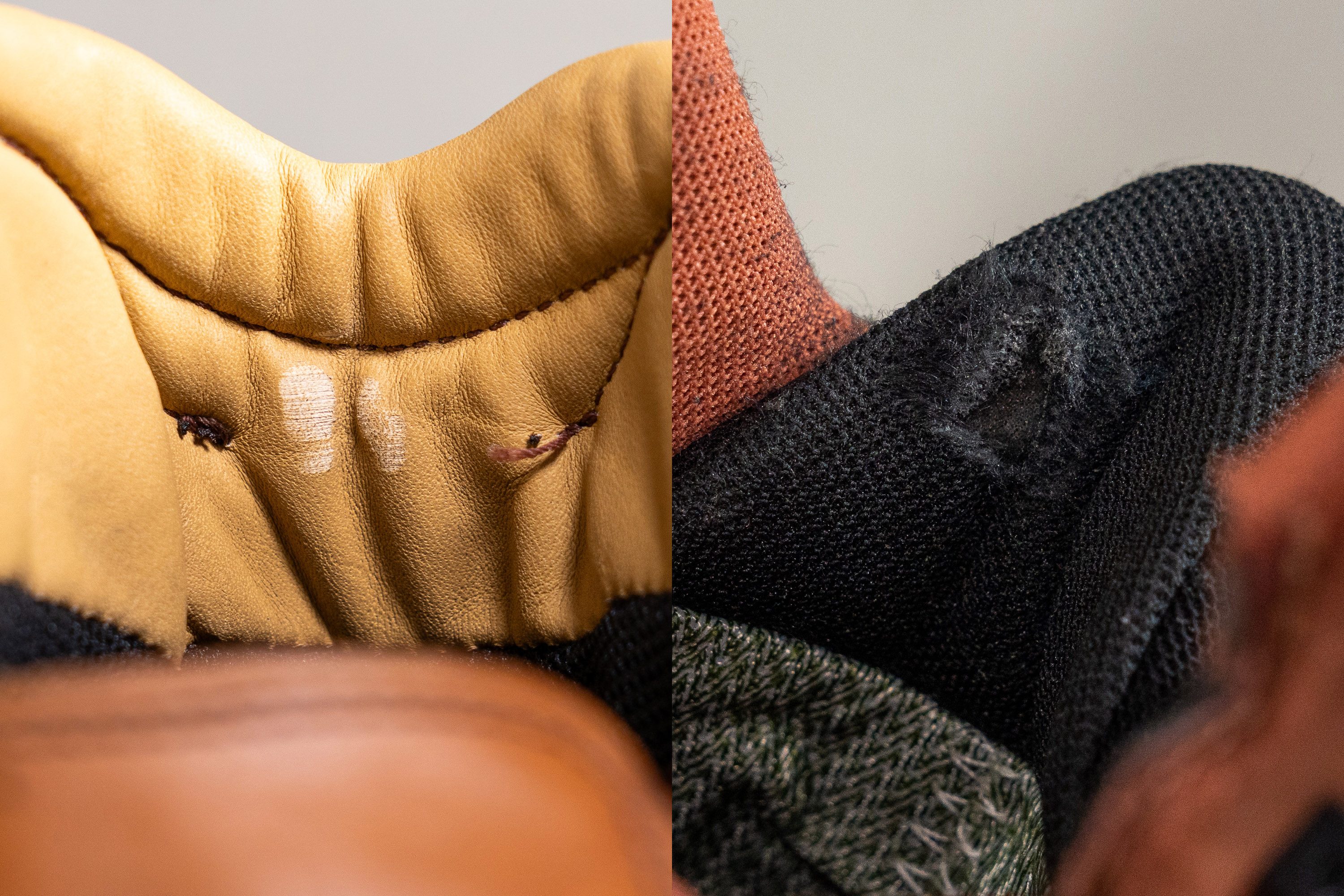
| Mountain Pass | 5 |
| Average | 3.6 |
Outsole hardness
Looking at the bottom of the Danner Mountain Pass, we saw that it uses reputable Vibram rubber for the outsole.
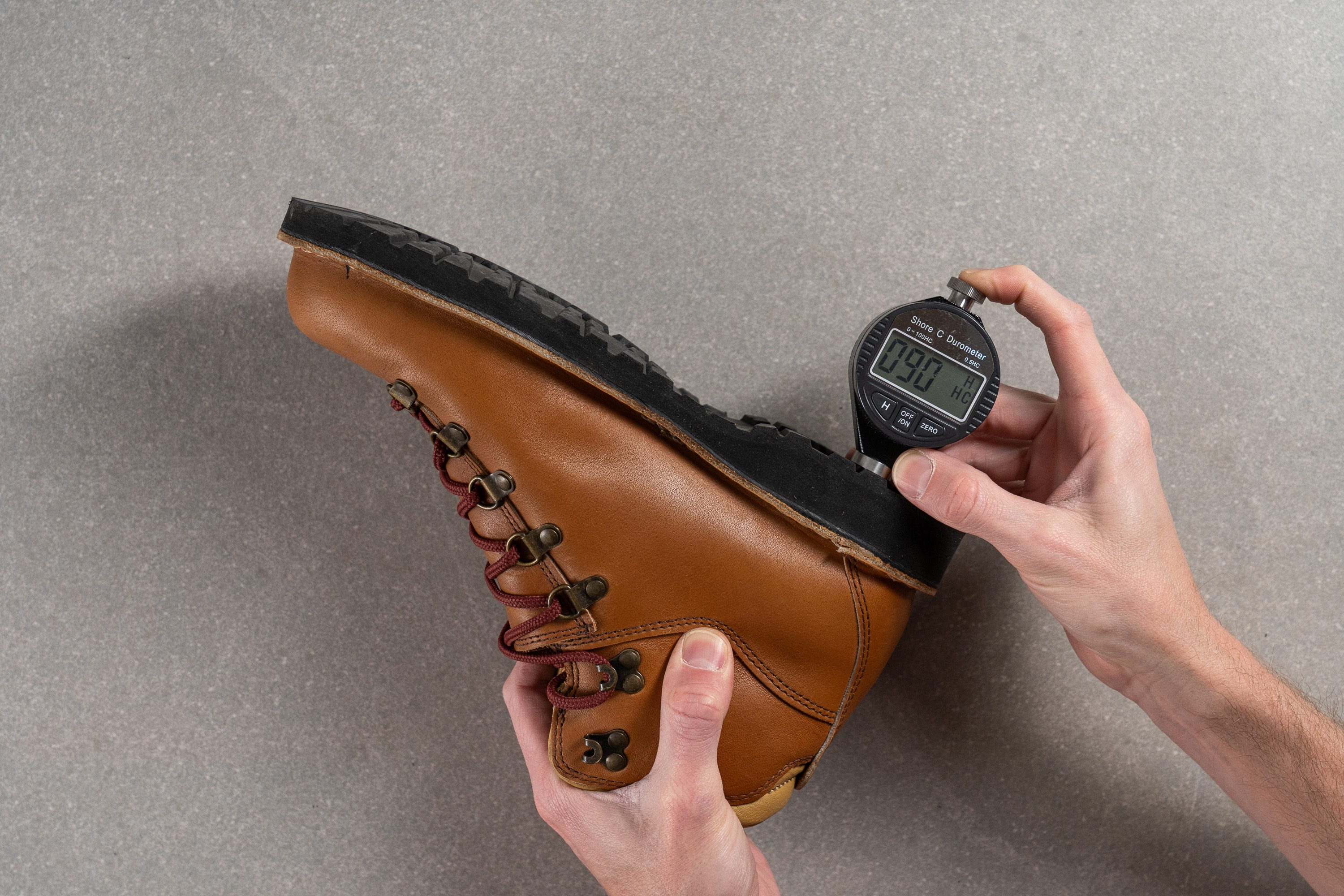
As expected, we found it to be nice and hard at 90 HC on our durometer. This is a standard measurement among hiking boots which is a good sign of durability.
| Mountain Pass | 89.9 HC |
| Average | 87.1 HC |
Outsole durability
Next, we turned to our Dremel to test the abrasion resistance of the boot's rubber. Ramping up the speed to 10K RPM, we challenged the Mountain Pass to a duel.
Amazingly, the boot's outsole sustained very little damage compared to the average! With a dent depth of only 0.5 mm, it proved to be among the most hard-wearing compounds we've tested!
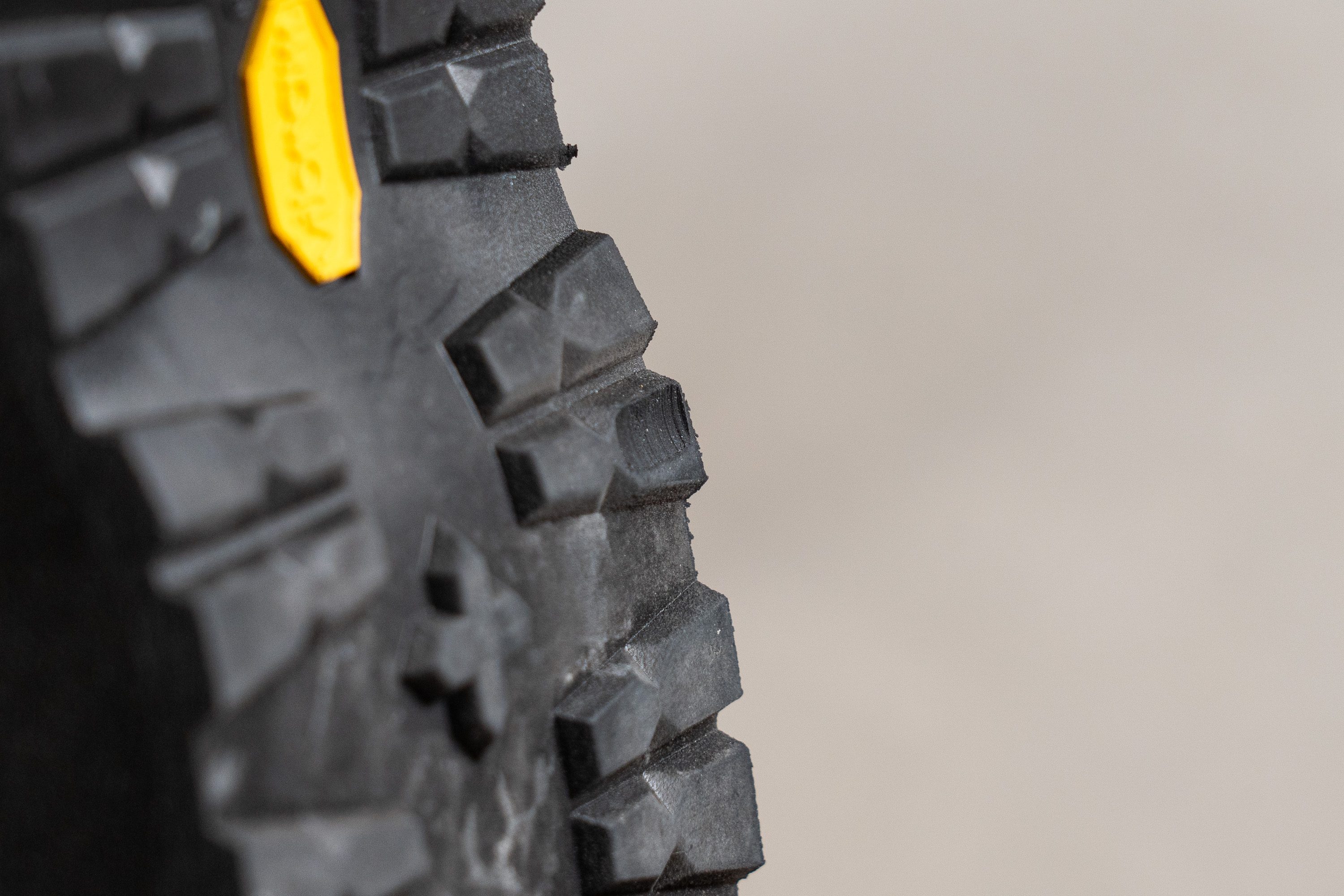
| Mountain Pass | 0.5 mm |
| Average | 0.8 mm |
Outsole thickness
The amount of rubber used on this Danner boot is quite reassuring too.
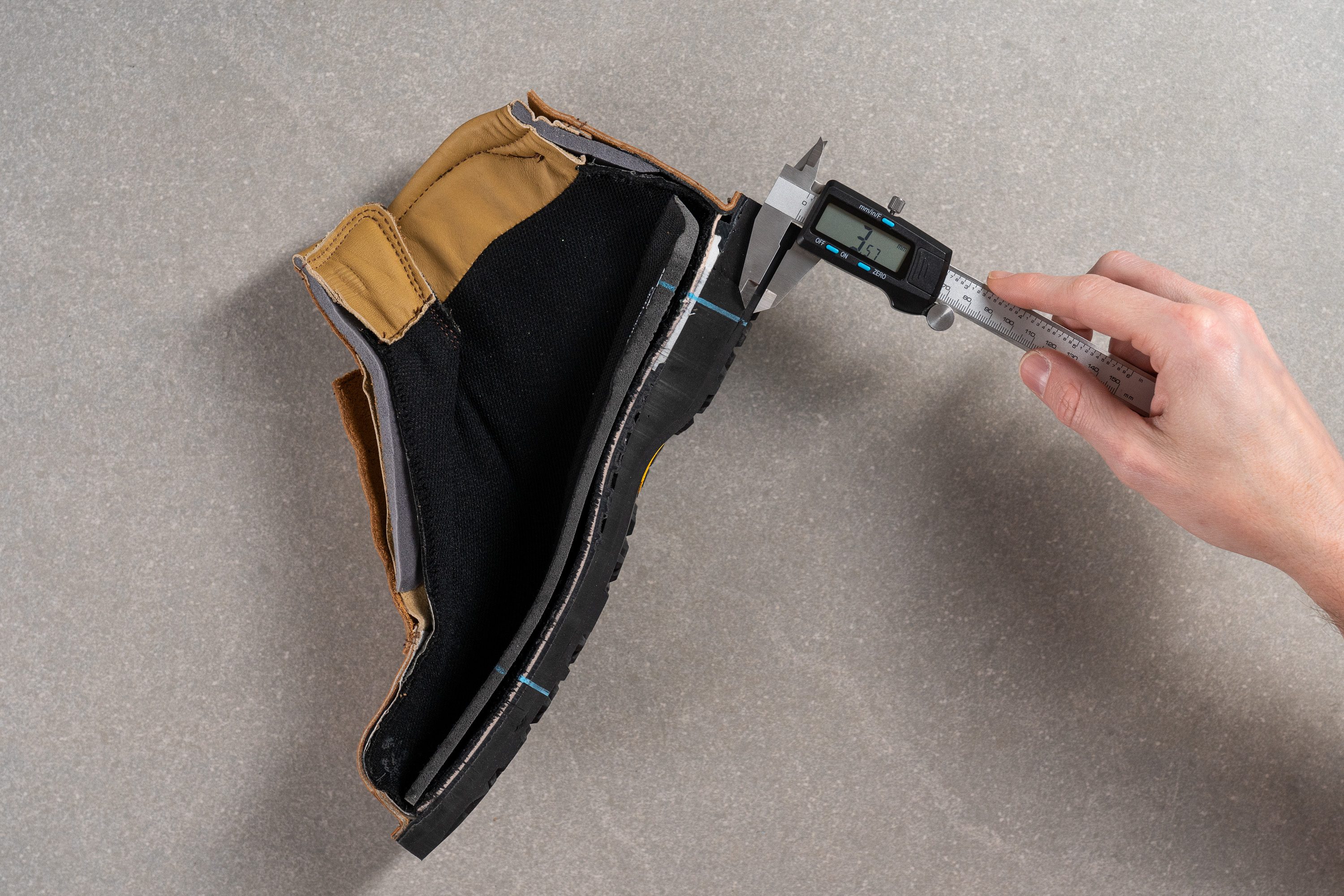
At 3.6 mm (excluding the lugs), it is even slightly thicker than the average! There is a good reason why people keep wearing their favorite pair of Danners for years.
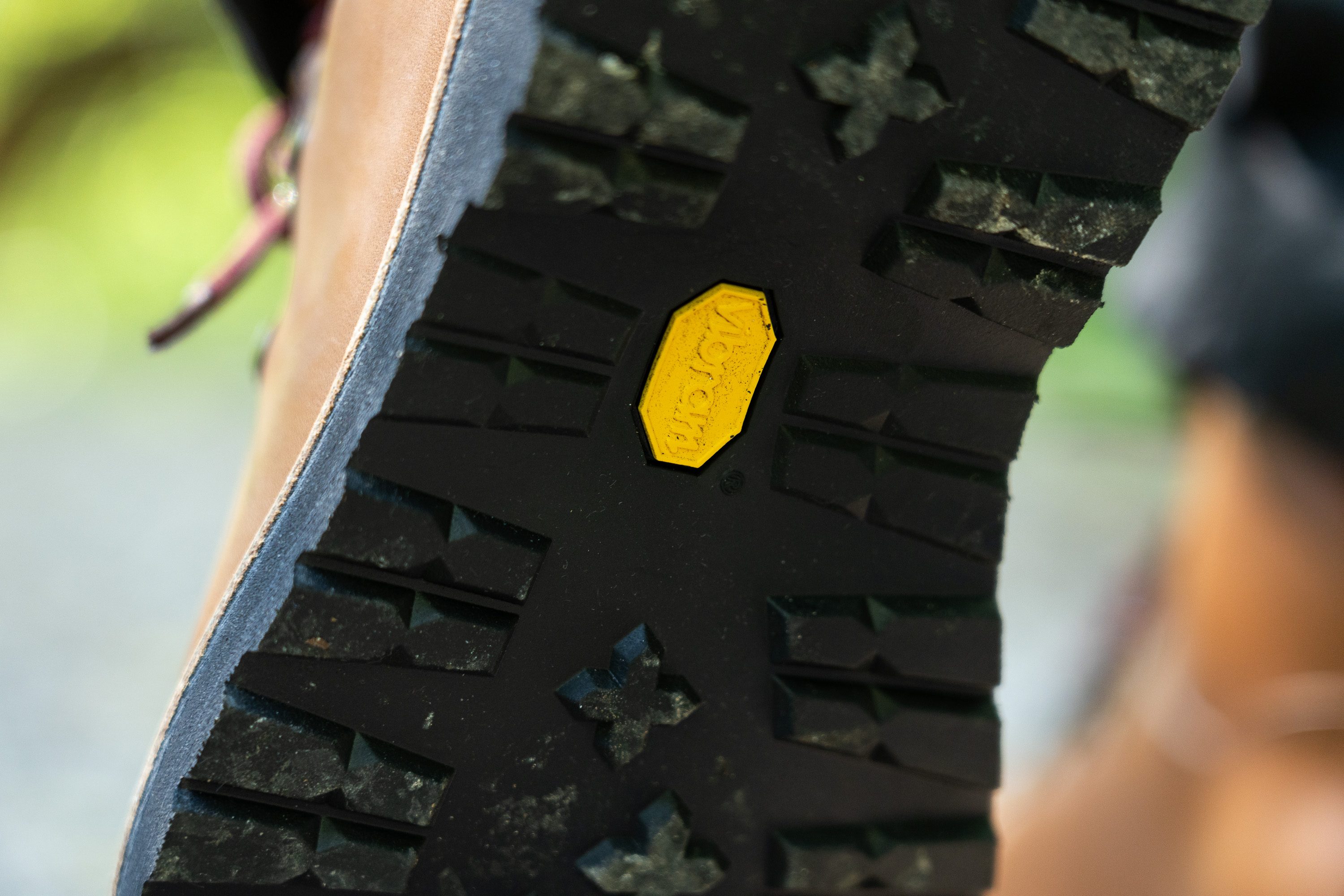
And when the rubber wears out beyond repair, you can resole the boot thanks to its stitchdown construction. This can be done through Danner or with the help of your local cobbler.
| Mountain Pass | 3.6 mm |
| Average | 2.9 mm |
Misc
Insole thickness
Gladly, we experienced the benefits of the boot's stout sole without being punished by it. Our feet were kept in comfort by the well-padded 6.9 mm insole.
It is slightly more padded than the average insole and it's from OrthoLite. It comes with an extra pillow underneath the heel to maximize impact protection.
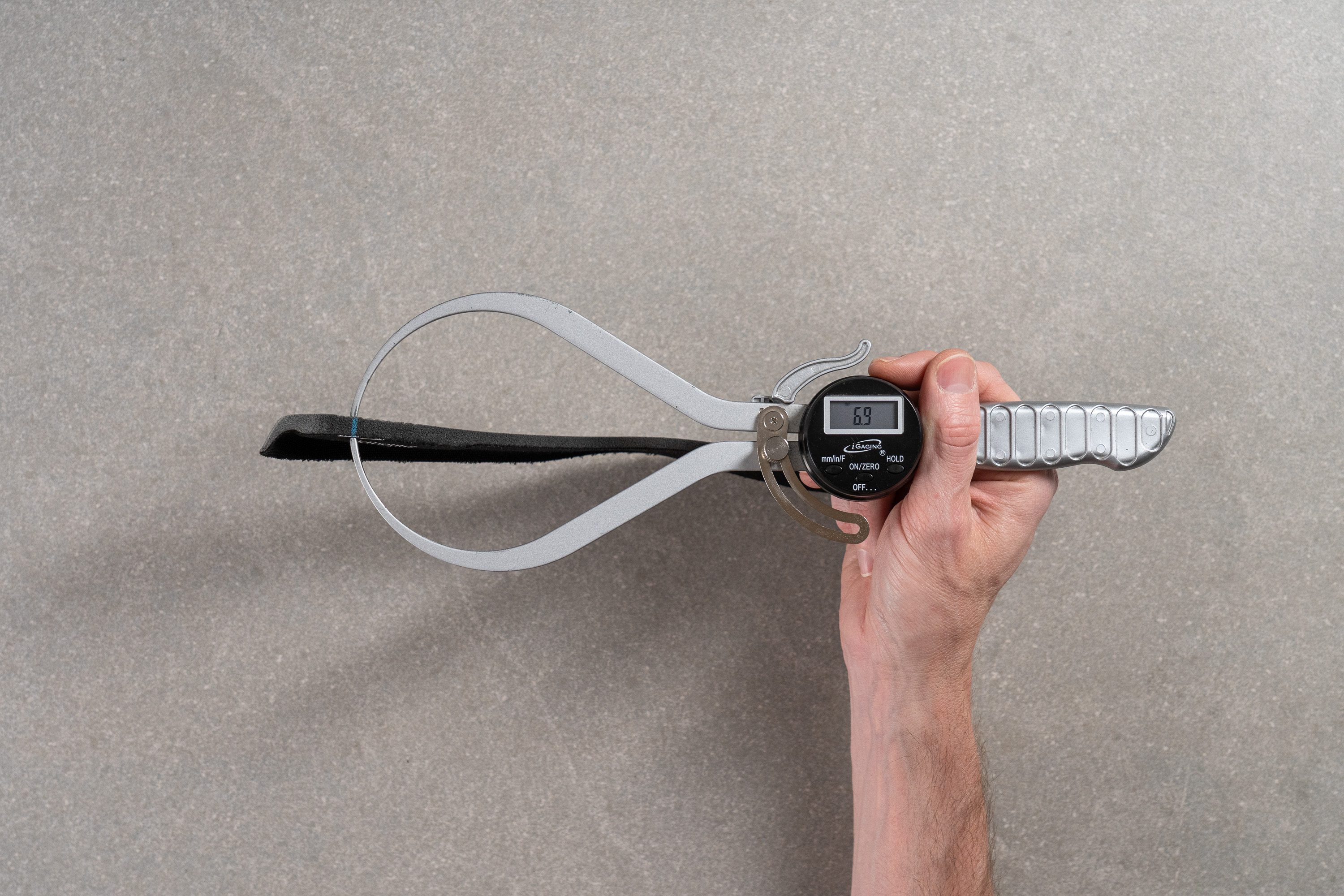
| Mountain Pass | 6.9 mm |
| Average | 6.0 mm |
Removable insole
The OrthoLite insole of the Mountain Pass is removable and can be easily replaced with custom orthotics.
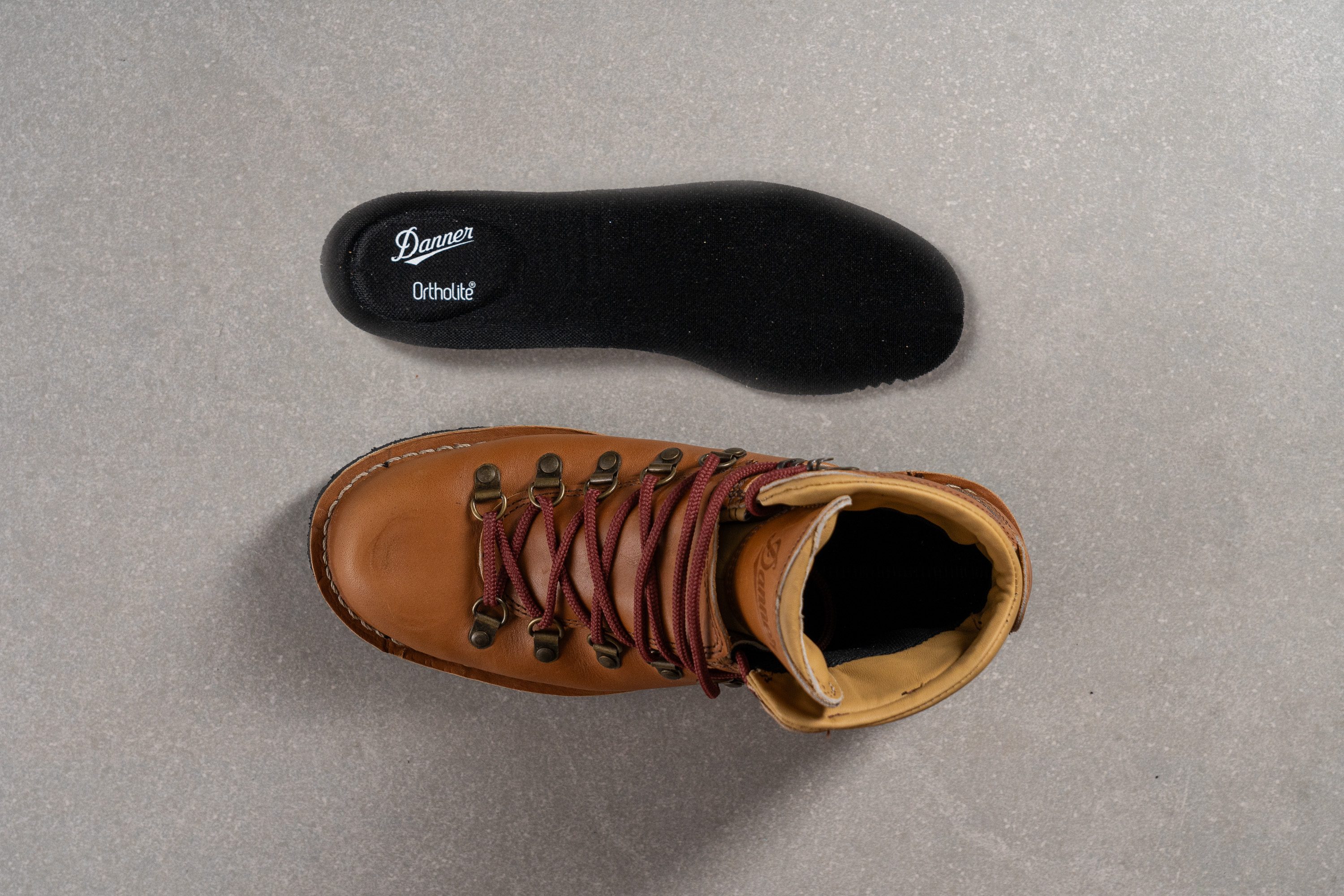
| Mountain Pass | Yes |
Midsole softness in cold (%)
We weren't surprised to discover that the boot's midsole foam didn't get much firmer in cold conditions.
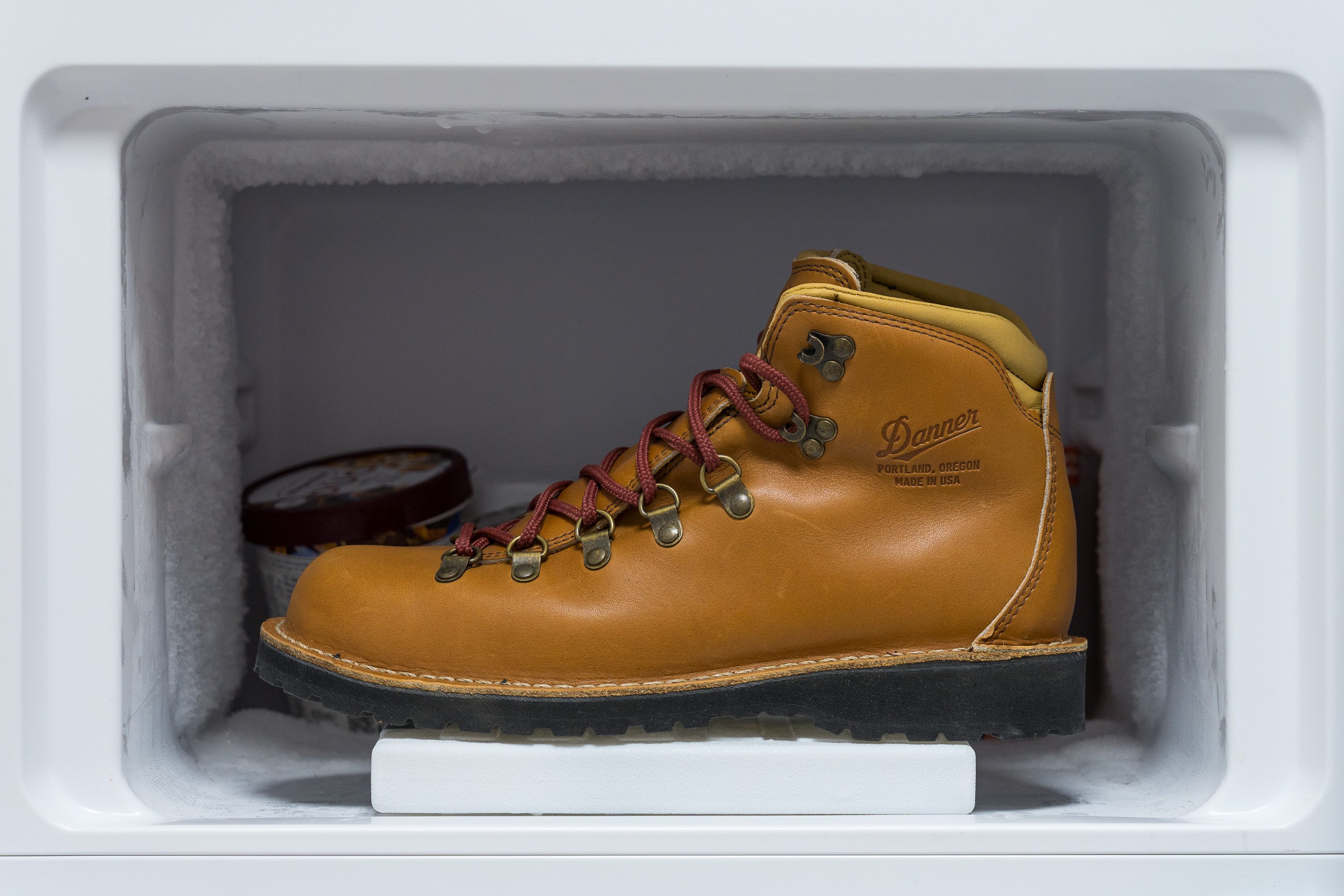
After keeping the boot in the freezer for 20 minutes, we found that the HA measurement increased by a mere 9%.
| Mountain Pass | 9% |
| Average | 20% |
Reflective elements
Well, we didn't expect a vintage boot to light up at night anyway.
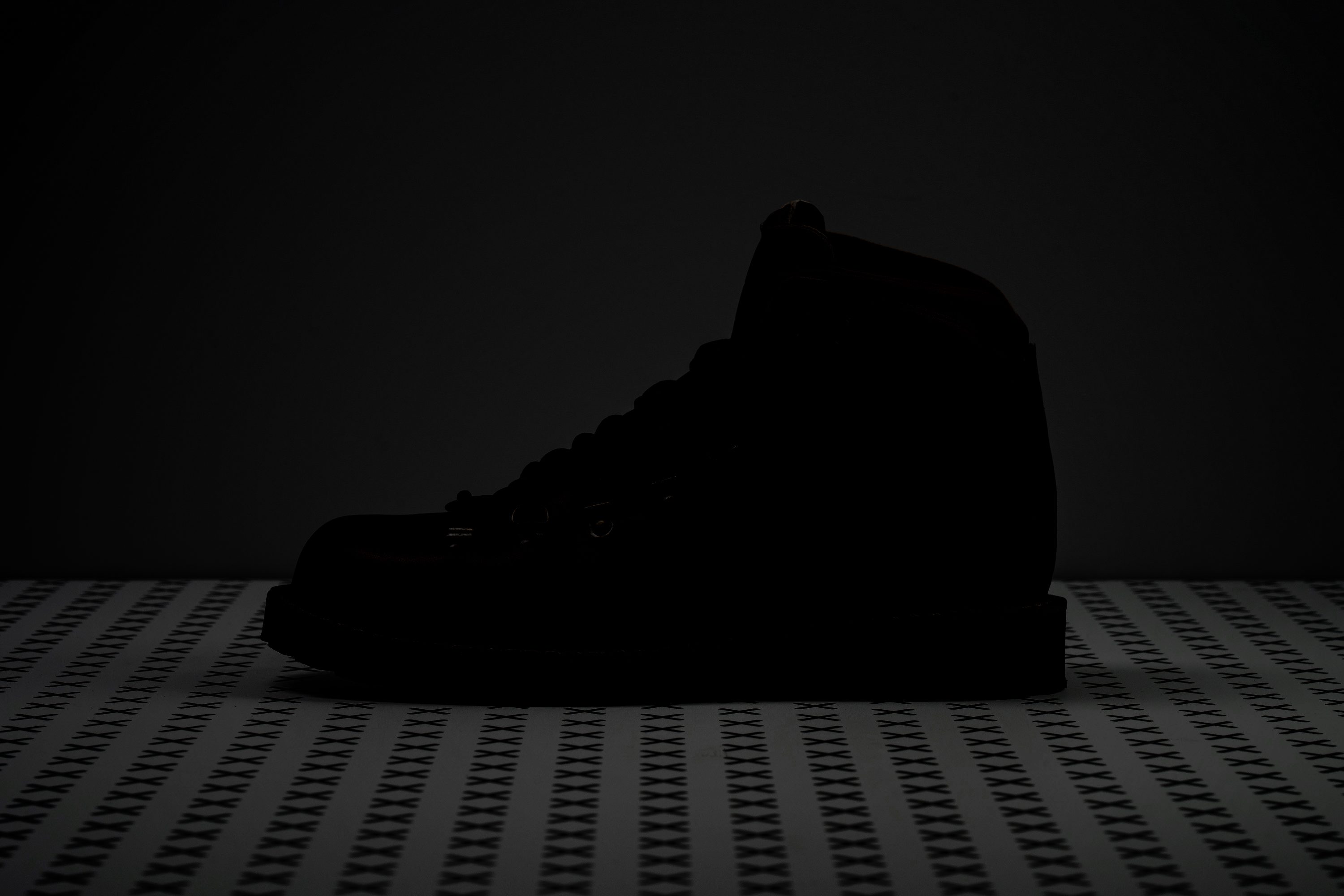
| Mountain Pass | No |
Tongue padding
The boot's well-padded tongue plays a big part in the boot's interior comfort. Measuring it with a caliper returned 10.9 mm which is on par with the average tongue thickness of hiking boots.
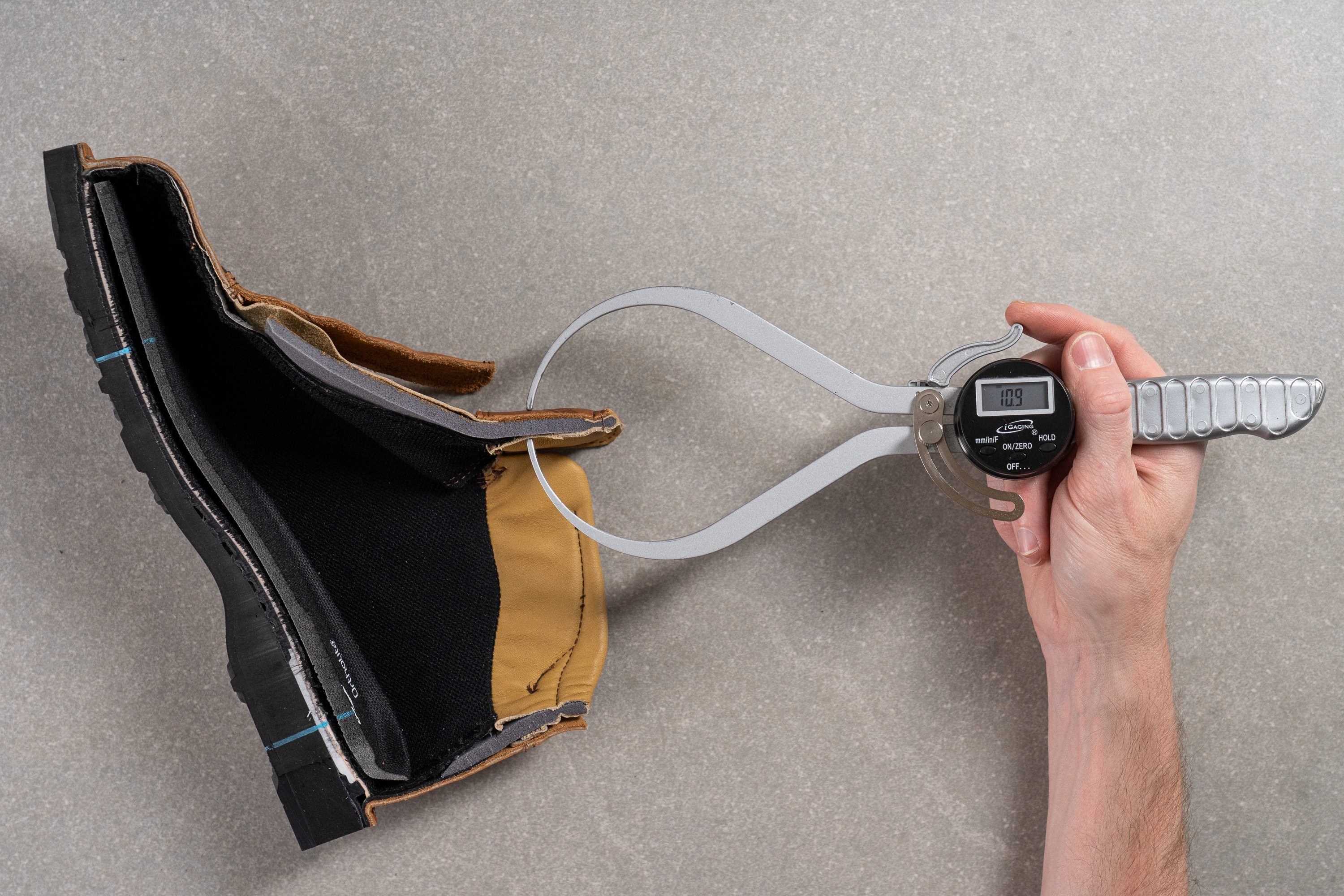
| Mountain Pass | 10.9 mm |
| Average | 11.2 mm |
Tongue: gusset type
Just like the other Danner boots, the Mountain Pass features a fully gusseted tongue.
Not only is it gusseted, but the tongue also comes with an extra leather overlay to cover up the entire instep and make the foothold even more secure. It also helps to prevent debris, dirt, and water from entering the boot's interiors.

| Mountain Pass | Both sides (full) |
Heel tab
A leather pull tab is attached at the back of this Danner boot to assist in the on-and-off action.
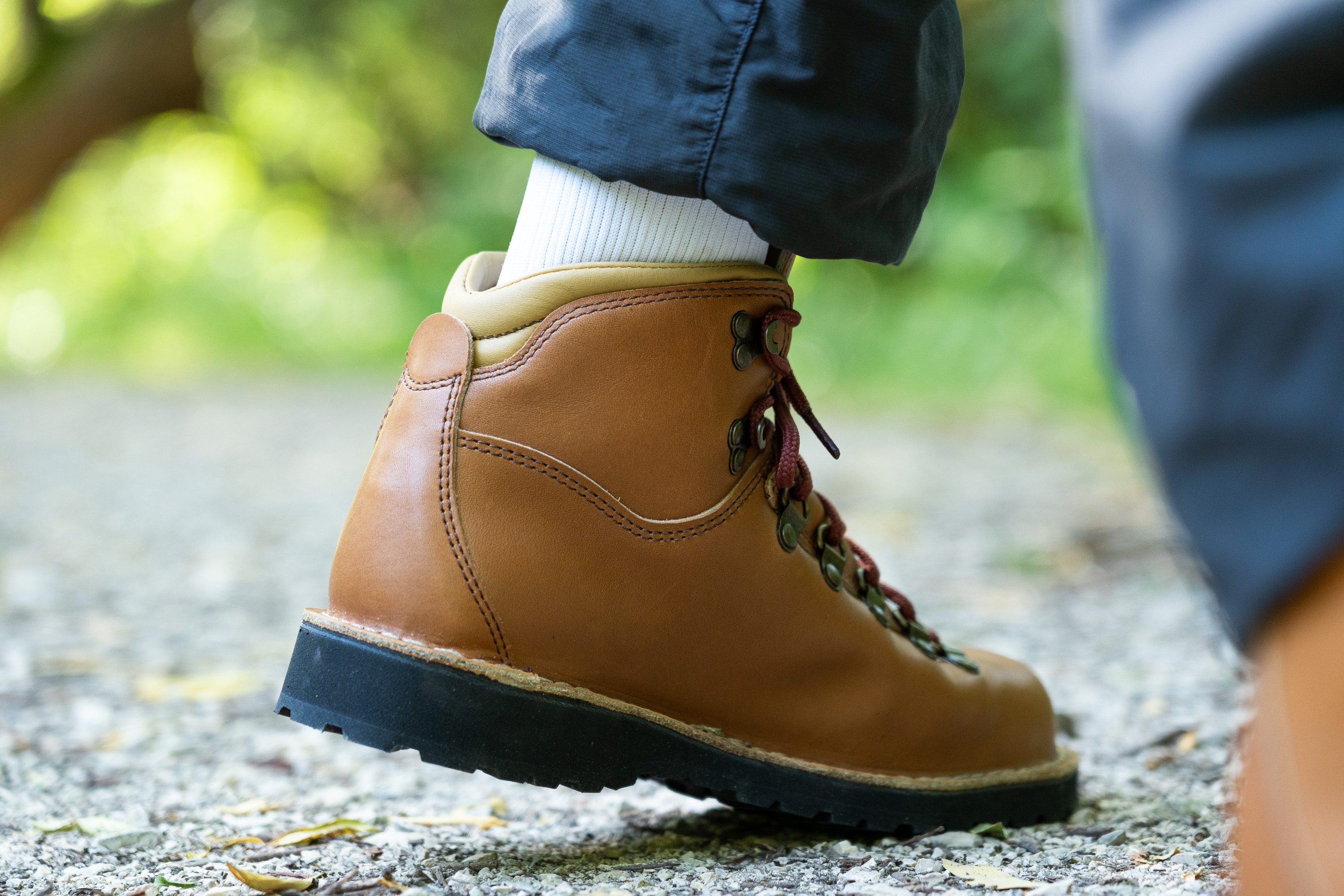
| Mountain Pass | Pull tab |

